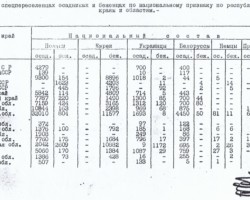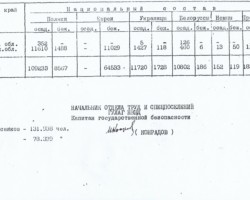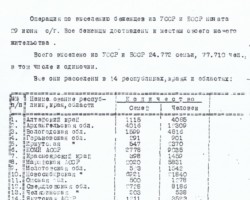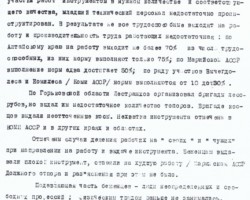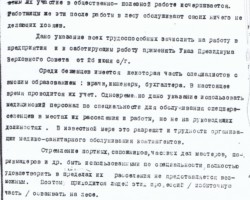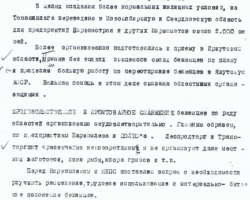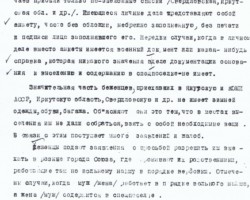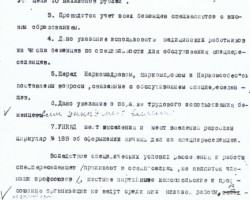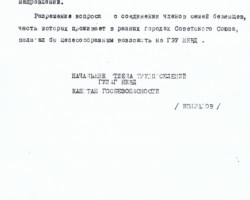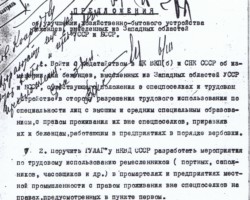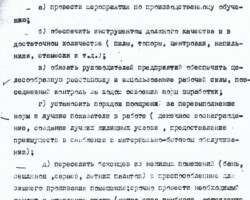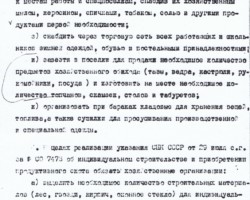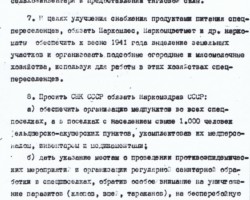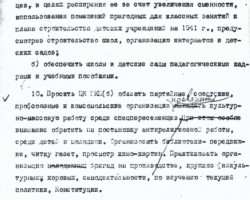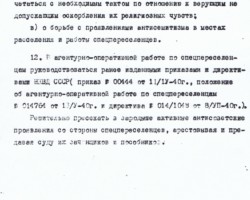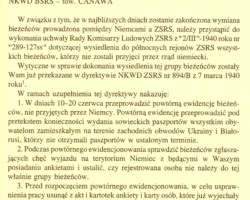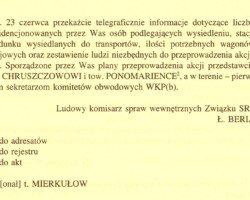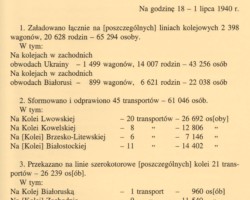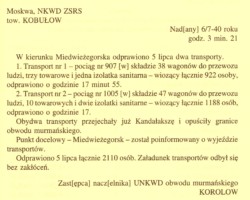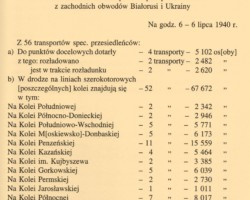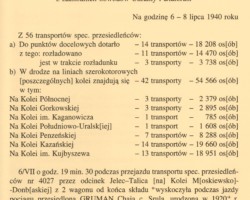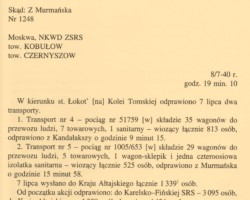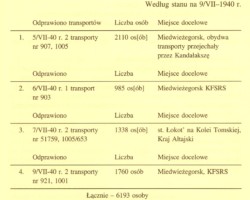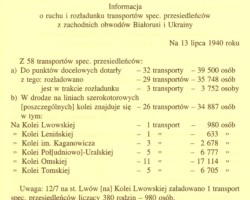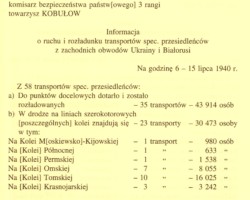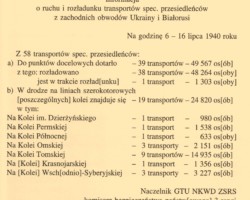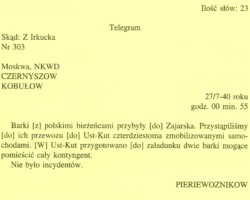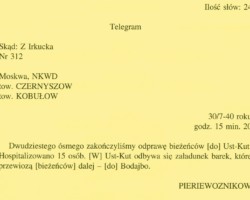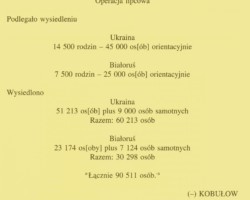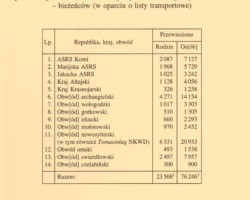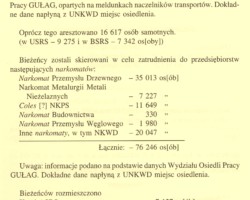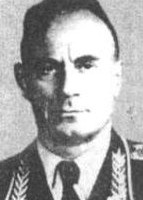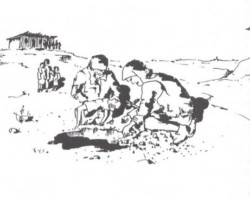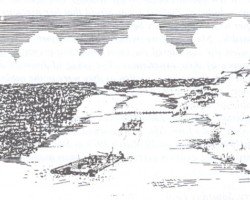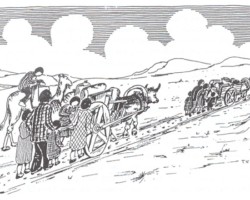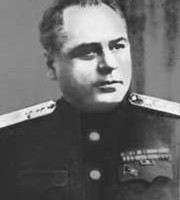Soviet Mass Deportations – June & July 1940
Exhibition Menu
Facts
Information
Exhibition Creator
Curator: prof. dr hab. Daniel Bockowski
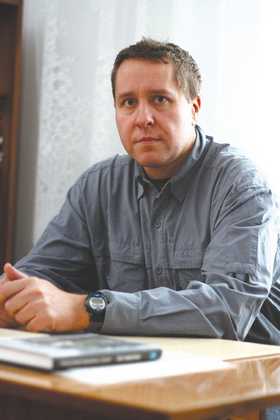
Author: Prof. Dr hab. Daniel Bockowski
Queries: Michał Bronowicki (iconography, documents, photographs, memories and accounts)
Cooperation: Martyna Rusiniak – Karwat
The history of deportations of Poles to Siberia throughout history - Prison of Nations
Exile as a form of punishment existed in Russia from the beginning of the 16th century, although the destination of exiles at that time was not Siberia in today’s geographical sense. It is necessary to distinguish between deportations, deportations and expulsions to Siberia and “to Siberia”.
In the first case, we are talking about exiles and deportations to areas stretching from the Urals to the Kolyma River, including Krasnoyarsk Krai and Yakutia, bounded to the north by the Arctic Ocean, and to the south by the territories of Kazakhstan and Mongolia. If we take into account the postulates of researchers, including Russian ones, that the Far East is included in Siberia, then its eastern border will be the Pacific Ocean. However, for the historical and geographical description of Siberia, we will stay at the border on the Kolyma River. According to the administrative division from the period of tsarist Russia, these were the lands of the Tobolsk, Tomsk, Yenisei and Irkutsk governorates as well as the districts of Zabaikal, Amur, Yakut and Seaside. Using today’s administrative division, mostly in force during the deportations of the 1930s and 1940s, Siberia includes: the Republic of Yakutia (Sakha), the Republic of Buryatia, Republic of Tuva, Republic of Altai, Republic of Khakassia, Altai Krai, Krasnoyarsk Krai, Zabaykalsky Krai, Khanty-Mansi Autonomous Okrug – Yugra, Yamalo-Nenets Autonomous Okrug, Tyumen Oblast, Omsk Oblast, Novosibirsk Oblast, Tomsk Oblast, Irkutsk Oblast and Kemerovo Oblast. All these areas, excluding Yakutia, are today part of the Siberian Federal District.
In the case of the historical concept of “Sibir”, we are dealing with exiles to practically all provinces and districts of the Russian and Soviet empires, including the previously mentioned lands of the Caucasus, Transcaucasia, the steppes of Kazakhstan, the Urals with the Sverdlovsk, Chelyabinsk and Perm regions, and the Republic of Bashkortostan, the Republic of Komi, Arkhangelsk region and Turkestan.
Another issue is the legal nature of the 16th-19th century exiles. There have never been uniform and clearly defined documents or tsarist regulations regarding exile as a form of punishment. From the very beginning, one of the most important purposes of the exiles was their “colonizing” character. The tsarist empire expanding to the east needed people to work and one of the ways to get them was forced deportation. Officially, this was not treated as a typical punishment for a crime, although this form of repression had all the hallmarks of it. The situation changed in the 18th century, and in 1822 the issue of exiles was regulated in a special act. By that time, there were more than 200 different types of legal acts in the tsarist legislation dealing with the criminal and economic aspects of exile. Formally, the term “exile” appeared in tsarist legislation in 1582 and was undoubtedly a means of repression. There were various types of punishment: sent to prison, sent to settle in a city or a selected settlement, sent to perform service (civil, spiritual and military) or to cultivate the land. Since 1649, all these categories of exiles have been included in specific legal norms. At that time, there were two main categories of criminals – the state and the state. In the eighteenth century, these differences disappeared, and from that time, exiles concerned political criminals. It is also worth mentioning that from the second half of the 17th century, criminal criminals sentenced to death, money counterfeiters with their families, people accused of “vagabondage”, theft and “suspicious contacts” were sent to Siberia. Peasant families soon found themselves among the deportees.
The first Poles found their way deep into Russia at the end of the 16th century, as a result of the war between the Polish-Lithuanian Commonwealth and Moscow during the reign of King Stefan Batory. 50 Polish prisoners of war were used to build Tara, a city located on the left bank of the Irtysh River, 302 km from Omsk. Others went deep into the tsarist empire after the so-called Polish intervention in Russia during the “great trouble” at the beginning of the 17th century, when Polish forces under the command of Hetman Stanisław Żółkiewski occupied Moscow for two years. We do not know how many exiles there were at that time, nor do we know if they were all Poles. It is known that in 1617 (during the Polish-Russian war that started in 1609 and lasted for the next nine years) 60 Poles and Lithuanians were sent “over the Urals”, who returned home after a few years. In the years 1614-1624, a total of several hundred prisoners were found in Siberia. In Russian documents, we often encounter the term “Lithuanian people”, which, however, does not clearly indicate the nationality of the exiled person, but rather the place of residence or residence before being taken into Russian captivity.
During the reign of the Vasa dynasty, after numerous wars between the Commonwealth and Russia, Russia and Sweden, and the battles for Ukraine, among dozens of Poles, most often prisoners of war, was the first Catholic priest known to us, Jędrzej Kaweczyński. He served his exile in Narym and Tobolsk, where in the first half of the 17th century there was certainly an unknown group of Poles.
The fate of the exiles most often depended on the place of deportation, their skills, level of education and chance. Thanks to literacy and specialist knowledge in a given field, many of them over time took up a number of positions in local administration and commerce. Some led research expeditions that penetrated the farthest regions of the tsarist empire, reaching the shores of the Pacific Ocean. We know the name of one of these explorers, exiled in 1621 – Samson Nowacki, who led a number of expeditions to the Lena and Yenisey. In turn, Adam Kamieński-Dłużyk, taken prisoner by the Russian army in 1660 on the Bania River, exiled to Kolyma, during his stay in Siberia reached the basin of the Lena River and the Amur. In the years 1664–1668, he also served as a prison supervisor in Yakutsk. Under the Andruszów truce of 1667 (ending the Polish-Russian war waged since 1658), he returned to Poland and described his stay in exile. In his The journal of the Moscow prison, cities and places contains the first geographical and ethnographic information in the history of Poland of this region of Siberia.
How many Polish POWs-exiles there were in the discussed period, little is known. Most likely, their number does not exceed several hundred. At the end of the 17th century, according to the data in the Russian archives, several thousand citizens of the Commonwealth lived in Siberia. Quite a large group settled voluntarily, looking for a place to develop their careers. Little is known about their nationality, although – as already mentioned – there were certainly Belarusians, Lithuanians, Ukrainians, and perhaps even Jews among them. These people, if they managed to survive the first, most difficult period of acclimatization, over time made considerable fortunes and worked at various levels of the Russian administration. A person about whom a little more is known was Paweł Chmielewski, which during the Dymitriads (two Polish military interventions in Russia during the “Great Troubles”, related to the plan to put successive candidates on the tsar’s throne claiming to be the son of the previous ruler – Ivan IV the Terrible, the first tsar in the history of Russia), which became one due to the Polish-Russian war that broke out shortly afterwards, in 1609, he went over to the Russian side in Moscow, for which he was handsomely rewarded. After some time, he was sent to Tobolsk for conspiring with the Poles in Smolensk. After a short stay in prison, he was released and laboriously climbed the career ladder in the Russian administration, reaching the position of commandant of Yenisiejsk in 1622, and then the inspector. Another well-known exile was Nicefor Czernichowski,
Not everyone was successful in exile. Harsh living conditions led to attempted rebellions and local uprisings. In the 1630s, Poles exiled to Tomsk and Tobolsk tried to provoke such a revolt, but it was bloodily suppressed. Returns from deportation under the peace treaties concluded by Russia and the Republic of Poland were a chance to improve their living conditions. However, the Russian authorities tried to persuade the Poles remaining in exile to stay, offering a number of concessions, promotions and pardons. From the point of view of the authorities, these actions were completely justified, as the Poles in exile mostly came from the nobility, so they had the education necessary for the efficient functioning of the local administration.
In the eighteenth century, not only the living conditions of exiles changed quite significantly, but also the scale of resettlement. In order to facilitate the flow of thousands of forced exiles-colonizers into the depths of the empire, special marching routes were marked out, staging points were created and settlement areas were strategically marked out. Before leaving, the exiles were gathered into groups, called parties, usually consisting of 150 to 200 people. The place of formation of such groups was Kaluga. From here, along the Oka and Volga rivers, exiles were delivered to Kazan. After creating further transports along the Kama River, they were sent to Nowy Usol. The next staging point was Wierchoturia, where people traveled on foot or rode in horse-drawn carts. Further, smaller batches of exiles were delivered by rivers to the assembly point – Tobolsk. Then, again by land, the deportees were driven to Tomsk, and from there to Irkutsk. in Irkutsk, based on the incoming demands from the local structures of the tsarist administration, people were sent to Okhotsk, the Far East, Kamchatka, Zabaikal and Yakutsk. The main rivers used for transport at that time were the Irtysh, Kama and Viluya. Due to the huge distances, many exiles died on the way as a result of disease, fatigue and punishment.
For those who arrived, it was no longer as easy to arrange a life as it was for the exiles from the 17th century. The tsarist administration was already organized, and the exiles were needed as cheap, hired labor. The legal nature of the shipment has also changed. The most severe sentence was lifelong exile and forced labour. People sentenced to life imprisonment were deprived of all political and state rights, and could never leave the place of forced settlement. A simpler form was simple exile and forced residence, similar to administrative settlements to which Poles were sentenced in 1940.
A new form of deportation was forced labour, probably best remembered in Polish historiography, which for many years was synonymous with exiles “to Siberia”. From the point of view of the tsarist authorities, it was the most efficient way to acquire and use slave labor in mines and special industrial plants. Convicts travelled to the place of deportation shackled on their hands and feet, often additionally attached to bars, beams and chains. Also in the case of this type of punishment, those sentenced to life imprisonment were deprived of all rights and remained at the disposal of the state until their death. The death penalty was almost always replaced with hard labor. Persons sentenced to hard labor for life were marked with letters burned on their bodies indicating the nature of the deportation (KAT, SK, K) before serving their sentence and subjected to brutal flogging,
Initially, hard labor was not associated with Siberia. Convicts worked in various European regions of Russia. The situation changed in the middle of the 18th century, when the demand for gold and coal mined in the mines of the Yekaterinburg and Nerchin districts increased. The first of them quickly declined in importance, while the second, located in the eastern part of the Zabaikal Oblast, became a terrifying place among convicts. Not only criminals worked in Zakłady Nerczyńskie, where silver was mined. A large group were the peasants sent there. There was also the Orenburg district in Western Siberia, but due to the relatively short distance from European Russia, it was not expanded.
The largest wave of Polish exiles arrived in Siberia in the second half of the 18th century, after the defeat of the Bar Confederation, established in 1968 (against Russian interference in the internal affairs of the Republic of Poland threatened with loss of independence and against the submissive Tsarina Catherine II, King Stanisław A. Poniatowski), although also in In the first half of this century, especially during the reign of Stanisław Leszczyński, a large group of supporters of the monarch were deported to the east. The Bar Confederates were the first group exiled for purely political reasons. There were about five thousand of them. They made their way through Kiev, Tula, Nizhny Novgorod, Kazan, Viatka, Perm, Yekatyrenburg to Tobolsk. From there they were sent to Irkutsk and the notorious Nerczynski Plant. They tried to force them into the army, however, it succeeded only in the case of a small group of rank-and-file soldiers from the nobility and the peasantry. The officers, for the most part, remained adamant. The most famous confederate (next to, among others, Kazimierz Pułaski – one of the commanders of the Confederate army and later a hero of the American Revolutionary War) was Count Maurycy August Beniowski, the author of extremely colorful memoirs reminiscent of the novel of a coat and sword, first sent to Kazan for anti-Russian speeches, and then then to Kamchatka, where he initiated the revolt of exiles and their escape from the peninsula. An interesting diary was also left by Karol Lubicz Chojecki, who was sent to Siberia for his participation in the Confederation, where he was forcibly conscripted into the Russian army, from which he escaped. Well-known confederates also include the Frenchman August Thesby de Belcour – exiled to Tobolsk, where he recorded his experiences. The Bar Confederates were released from exile under Catherine II’s order in 1773, but General Denis Chicherin did not carry out the order, sending only officers and invalids to Poland. The rest of the soldiers he recruited to the Cossack troops. He finally released them only in 1781, but about 90 people remained in exile voluntarily and made their lives there.
In the years 1794-1797, they were joined by the participants of the Kościuszko Uprising, aimed – in defense of Poland’s independence – against Russia and Prussia. In total, it was about 5-6 thousand people. The situation improved in 1796, when Tsar Paul I issued another order to free Poles. How many actually returned from exile at that time is unknown. It is known, however, that one of the most famous exiles of that period was General Józef Kopeć, the author of an interesting diary, first imprisoned in Smolensk, then exiled to Kamchatka, where he conducted valuable ethnographic research.
Subsequent groups of Poles found their way to Siberia during the partitions, as a result of the activities of the first secret conspiracy organizations, such as the Warsaw Central Assembly, the Patriotic Union operating in Lithuania, or the Union of Good Poles operating in Volhynia. Among those arrested at that time was Józef Bohusz, who went to exile with his wife. Perhaps she was the first Polish woman who voluntarily ended up in Siberia as a result of tsarist repressions. After 1815, most of the exiles were allowed to return. Only 160 people were drafted into the Cossack units. Nevertheless, after the defeat of Napoleon, who in 1812, having amassed a multinational army (including about 90,000 Poles), tried to conquer Russia, probably about 900 Poles were sent “to Siberia”.
During the existence of the formally autonomous Kingdom of Poland (established in 1815 after the Congress of Vienna – a great, two-year conference of 16 European countries), repressions on both sides of the “border” had a different character. Inhabitants of the “incorporated lands” wandered into exile on the terms applicable to all subjects of Tsarist Russia, while the inhabitants of the Kingdom, under the constitution given by Tsar Alexander I (adopted as a result of the decisions of the Congress in 1815, establishing a personal union between the Kingdom and the Russian Empire; from then on, the Tsar became at the same time the king of Poland) served their sentences on the spot. What mattered was the official entry in the population registers, not the place of residence. During this period, representatives of the Filomats and Filarets (conspiratorial patriotic associations of Vilnius youth) went into exile, people active in secret Russian circles and sympathizing with the Decembrists (participants of the anti-tsarist uprising in the 1820s). Among those deported, it is worth mentioning Count Mikołaj Worcell, sent to a penal company in the Caucasus, Anzelm Iwaszkiewicz, Seweryn Krzyżanowski – a member of the secret pro-independence Patriotic Society operating in the Kingdom of Poland and Piotr Moszyński – marshal of the Volhynian nobility, sent to Tobolsk for his underground patriotic activities. The situation changed in 1832, when the constitution of the Kingdom of Poland was abolished. However, since it was still impossible to formally send the citizens of the Kingdom deep into Russia, the institutions of “arrest squads” were used. Among those deported, it is worth mentioning Count Mikołaj Worcell, sent to a penal company in the Caucasus, Anzelm Iwaszkiewicz, Seweryn Krzyżanowski – a member of the secret pro-independence Patriotic Society operating in the Kingdom of Poland and Piotr Moszyński – marshal of the Volhynian nobility, sent to Tobolsk for his underground patriotic activities. The situation changed in 1832, when the constitution of the Kingdom of Poland was abolished. However, since it was still impossible to formally send the citizens of the Kingdom deep into Russia, the institutions of “arrest squads” were used. Among those deported, it is worth mentioning Count Mikołaj Worcell, sent to a penal company in the Caucasus, Anzelm Iwaszkiewicz, Seweryn Krzyżanowski – a member of the secret pro-independence Patriotic Society operating in the Kingdom of Poland and Piotr Moszyński – marshal of the Volhynian nobility, sent to Tobolsk for his underground patriotic activities. The situation changed in 1832, when the constitution of the Kingdom of Poland was abolished. However, since it was still impossible to formally send the citizens of the Kingdom deep into Russia, the institutions of “arrest squads” were used. Seweryn Krzyżanowski – a member of the secret pro-independence Patriotic Society operating in the Kingdom of Poland and Piotr Moszyński – the marshal of the Volhynian nobility, exiled to Tobolsk for his underground patriotic activities. The situation changed in 1832, when the constitution of the Kingdom of Poland was abolished. However, since it was still impossible to formally send the citizens of the Kingdom deep into Russia, the institutions of “arrest squads” were used. Seweryn Krzyżanowski – a member of the secret pro-independence Patriotic Society operating in the Kingdom of Poland and Piotr Moszyński – the marshal of the Volhynian nobility, exiled to Tobolsk for his underground patriotic activities. The situation changed in 1832, when the constitution of the Kingdom of Poland was abolished. However, since it was still impossible to formally send the citizens of the Kingdom deep into Russia, the institutions of “arrest squads” were used.
They appeared after the November Uprising directed against Russia (started in 1830 and finally lost after 11 months of fighting), although until 1836 they formally functioned outside the Kingdom of Poland. These were penal battalions where people were sent for crimes committed during military service. The convicts worked in military fortresses. If they were not soldiers, the punishment was called civilian recruitment. The rotations lasted from 5 to 15 years. Anyone who tried to escape or committed a crime during the service under the tsar’s order of 1834 could be sent to Siberia. It was on the basis of such laws that Poles fighting in the November Uprising were punished. The basis for the sentences was the Military Field Code of the great active armyfrom 1812. The insurgents were conscripted into rotas in Siberia, the Caucasus and the Urals, sent to the Arkhangelsk and Orenburg governorates, as well as to the “Kyrgyz steppes”, i.e. to today’s Kazakhstan. We do not know the exact number of those punished, but the surviving lists include 774 names.
In the period between the uprisings, other conspirators were sent “to Siberia”. The first was a group of about 100 people sentenced for participating in a conspiracy of Colonel Józef Zaliwski, a military man in the army of the Kingdom of Poland and an independence activist. For participation in the conspiracy, about 50 peasants from the Grodno and Minsk regions, as well as a group of priests, were sent east. There were several women among the deportees, including Marianna Karpińska. In 1838, nearly 100 people were sentenced to exile for participating in the conspiracy of Szymon Konarski – a former November insurgent and independence activist. Among them: Gustaw Ehrenberg – son of Tsar Alexander I, an activist of the Polish People’s Association, and Aleksander Wężyk (also a member of the Polish People’s Party, who together with Ehrenberg initiated the activities of the Association, previously founded in Galicia by Szymon Konarski). A year later, in Łomża, the group of Rafał Błoński – a lieutenant of the Polish army, who was sent to Siberia for 17 years for his underground activities for independence (he wrote a diary about it), was broken up in Łomża, from which he returned and took part in the January Uprising that broke out in 1863. 24 people were then sentenced to exile. Conspirators operating in the association of priest Piotr Ściegienny (organizer of independence movements), Galician insurgents from 1846 and 36 members of the organization of Henryk Krajewski from Warsaw (an activist of democratic conspiracies, exiled to the vicinity of Nerczyńsk) and many other underground organizations operating in the Kingdom of Poland and In Lithuania. Political emissaries and emigrants who secretly entered the Kingdom of Poland were also sent to exile, as well as people fighting during the Spring of Nations (a series of revolutionary social and national uprisings in Europe in the years 1848 – 1849). In total, about 600-800 Poles were sent to the East for political activity at that time, of which over 200 ended up in Siberia. Among them was a member of the National Government during the January Uprising started in 1863, a journalist and writer, Agaton Giller, captured in 1853 by the Austrian authorities and extradited to Russia. Sentenced to hard labor, he served in penal battalions in eastern Siberia. The result of his stay in exile were several works about exiles and Siberia published after returning to the country (e.g. Among them was a member of the National Government during the January Uprising started in 1863, a journalist and writer, Agaton Giller, captured in 1853 by the Austrian authorities and extradited to Russia. Sentenced to hard labor, he served in penal battalions in eastern Siberia. The result of his stay in exile were several works about exiles and Siberia published after returning to the country (e.g. Among them was a member of the National Government during the January Uprising started in 1863, a journalist and writer, Agaton Giller, captured in 1853 by the Austrian authorities and extradited to Russia. Sentenced to hard labor, he served in penal battalions in eastern Siberia. The result of his stay in exile were several works about exiles and Siberia published after returning to the country (e.g.Polish graves in Irkutsk ).
Before the November insurgents reached Siberia, under the tsar’s orders in 1822, the reform of Michał Sperański (a Russian lawyer and advisor to Tsar Alexander I) was passed. It made thorough changes in the structure of administering those who were in exile. The Tobolsk Office for Exiles and the local prison administration were established, which was to keep a register of exiles and ensure compliance with release dates. It was also supposed to take care of the distribution of exiles in the settlements and to provide them with the means of subsistence. For the first time, it was written that people should be paid for their work. The children of forced laborers were included in the category of free settlers. Complaints allowed. Staged prisons were built along the prisoner transport routes to facilitate checks by guards during stops.
The route of the deportees started in Moscow, from where they went on foot through Włodzimierz, Nizhny Novgorod, Kazan, Yekatyrenburg, Tobolsk, Tomsk, Krasnoyarsk, Irkutsk to Chita. River transport was used only on the stages from Nizhny Novgorod to Perm and from Tyumen to Tobolsk. In Siberia, the exiles had to go through a total of 61 stages. Men were going to Tobolsk in shackles.
The largest group of Poles was sent to hard labor and deportation after the January Uprising. In the years 1863-1867, more than 25,000 people went deep into European Russia, Siberia and the Caucasus. About 1,800 relatives went into exile voluntarily with them. Over 6,000 people were conscripted into prison rots. There were over 18,000 Poles in Siberia, which constituted over 32% of all deportees from all over Russia. 23% of Poles were sentenced to hard labor. At least 340 clergymen were among those repressed. In 1881, 270 people still in exile were counted.
The post-uprising period, although on a smaller scale, still abounded in various “streams and rivulets” of political exiles. In the course of one case, on average, a dozen, sometimes several dozen people were convicted. Among those sent deep into Russia at that time was Wacław Sieroszewski – a writer, recognized and supported by the Russian Geographical Society, the author of many ethnographic works about the inhabitants of Yakutia and the Far East, as well as Bronisław (an ethnographer describing the peoples of Sakhalin, where he ultimately stayed) and Józef Piłsudski. Increasingly, socialist activists associated with, among others, wandered to Siberia. with the “Proletariat” movement – a Polish political party based on the assumptions of Marxism and party-organizations continuing its ideas after the breakup of the group. In 1893, a dozen Polish and Jewish workers from Lodz were sent deep into Russia for planting a bomb. Among those convicted of revolutionary activities were Władysław Studnicki, Ludwik Janowicz and Jan Stróżecki (socialist activists, members of “Proletariat”).
The beginning of the 20th century brought an increase in exile penalties. The real breakthrough was the repression after the revolution of 1905. In the years 1901-1911 in the Kingdom of Poland, 3,153 people were sentenced to hard labor, and 258 to exile. In the years 1905-1910, about 10,000 people were sent to the east without court sentences, and in the next two years, another thousand people. The largest concentrations of Poles were in Tomsk, Omsk, Irkutsk, Krasnoyarsk, Nerczyńsk and Vladivostok. Large groups of Poles found themselves in Siberia during World War I. They were mainly forced displaced persons from war-torn areas, refugees (runners) and prisoners of war.
To this day, we do not have full information on how many people decided to voluntarily go to Siberia. Certainly, soldiers settled here after completing their service, if they got married during it, military doctors, civil servants, graduates of universities and vocational schools who had to serve education allowances. There was also considerable economic emigration. Most of them were engineers and mechanics leaving for the construction of the Trans-Siberian Railway. From the second half of the 19th century, this emigration began to gain momentum. The population from the lands of the Kingdom of Poland prevailed. The number of emigrants from “Kongresówka” (as the areas of the Kingdom of Poland were colloquially called) into Russia in 1910 was estimated at 400-600 thousand people. Most of the Poles who settled in Siberia were peasants.
Mass deportations to the USSR as an element of the sovietization of the Eastern Borderlands
Almost immediately after the Red Army troops entered the eastern territories of the Second Polish Republic on September 17, 1939, the repressive apparatus of the NKVD began to carry out its basic task, which was to take control of the plundered lands and break any forms of resistance against the new government in the bud. One of the most important goals was to organize an effective administrative and police apparatus responsible for the gradual sovietization of the occupied lands. On the so-called In Western Belarus and Western Ukraine, the formation of a new loyal Soviet citizen began. The slogans for the liberation of “the oppressed brothers of Ukrainians and Belarusians” turned out to be empty slogans. There was no question of any freedom, at most – for short-term propaganda purposes – Poles were ostentatiously pushed to the bottom of the social ladder,
In order to implement the program of sovietization of Kresy, it was first necessary to clear these lands of people who, according to the authorities, were the greatest threat. One way was mass deportation. They combined several important factors: political – getting rid of actual and alleged enemies, economic – obtaining hundreds of thousands of free hands for felling forests, building new railway lines and maintaining existing ones, and the security factor – intimidating the public in the occupied territories with the scale of repression to break any will to resist. The economic factor, although very important, especially in the case of the February deportation (carried out on February 10, 1940), was not the main reason for the repression. Also, the national character of repression in many cases gave way to the social goal – the elimination of potential enemies of the new order.
In the case of each deportation, decisions to carry it out were made at the highest levels of USSR state authority. The persons directly responsible for starting each large deportation action were Joseph Stalin, Lavrentiy P. Beria and Vyacheslav Molotov, as well as other members of the Council of People’s Commissars of the USSR (RKL USSR). In turn, the coordinators of the whole at the state level were the head of the NKVD (People’s Commissariat for Internal Affairs) Lavrentiy Beria, his deputy Vsevolod N. Merkulov and the head of the Administration and Economic Directorate of the NKVD of the USSR Bakhcho Z. Kobulov. In the republics from which the deportations were carried out, the action at the republican level was coordinated by the heads of the NKVD: for the Ukrainian SRS – Ivan A. Serov, for the Belarusian SRS Lavrentij F. Canawa (properly surname Dzhanzhgawa).
Documents regarding the start date and course of each action were issued in Moscow well in advance, so that the best possible preparation could be made. Decrees regarding the February deportation were issued on December 4 and 5, 1939, and the April action – carried out on April 13, 1940 – March 3, 1940. The same regulation specified the course of the resettlement of refugees two months later. After the action was completed, detailed reports were sent to the coordination centers where they were analyzed, trying (usually unsuccessfully) to remove organizational shortcomings on an ongoing basis. Year after year, the Soviet repressive machine learned how to carry out mass resettlements in the most effective way and at the lowest cost. Initially, only politically uncertain groups, at the end of World War II – entire nations.
All displaced groups received a special status that determined their fate and the fate of their children for many years. Those sent by the Soviets in the 1930s (including Poles from Dzierżyńszczyzna in Soviet Belarus and Marchlewszczyzna in Soviet Ukraine, deported mainly to Kazakhstan) were referred to as trudposielency. During World War II, interchangeably, also as spiecposielency . According to the state of January 1940, this contingent consisted of 997,513 people, and in 1941 – 930,221. They were mainly peasants displaced as part of forced collectivization in the USSR. The deportees from the 1940s were classified into several groups:
- people deported in February 1940 were classified as spiecpieriesielency-settlers , less often as former Polish settlers and foresters ;
- those deported in April 1940 under the administrative-emissary category , although sometimes they were also referred to as spiecpieriesielency ;
- people deported in June-July 1940 were in the category spiecpieriesielency-runners ;
- people deported in the summer of 1941 (both from Western Belorussia and Western Ukraine, as well as from Lithuania, Latvia, Estonia and Moldova) were referred to as residing. The following terms are also used interchangeably in Soviet documents for this group: administrativno-ssylnyje and ssylno-pieresielency .
Only groups defined as spiecpieriesielency were directly under the control of the NKVD and were placed in special settlements ( spiecposiołki) . The second and fourth contingents were sent in administrative mode and were only under the careful control of the NKVD authorities, mainly in kolkhozes and sovkhozes.
Classic deportation, also called deportation, deportation, forced displacement or resettlement in various sources, involved, according to the instructions, whole families cohabiting in one household or apartment. In practice, this meant that even if one of the residents was not on the lists for deportation, they were already on them during the operation. Cases of leaving such people in the house from which the deportations were carried out were rare. In exile, the legal status of children born from the union of parents assigned to a given contingent was inherited.
Preparations were made very carefully for each deportation. At least that’s what the documents that have survived to this day show. In the first phase, the planning of the action was carried out in Minsk and Kiev without informing the authorities of the western regions of the Byelorussian SSR and the Ukrainian SSR about everything. The documents found in Minsk show that the lists of people to be deported were prepared on the spot and only then sent to the occupied territories for initial verification. The verification took place in a very small group, with the greatest possible secrecy. After calculating the size of the presumed contingent, the data was first sent to the regional headquarters, and then to the commissions in Minsk, Kiev and Moscow coordinating the entire operation. Based on the presumed contingents of deportees, the demand for wagons to transport them, the convoy necessary for the operation and financial resources – for equipping the wagons, remuneration of participants in the action and possible provisions for the deportees on the way, were prepared. Guidelines were also sent to the relevant people’s commissariats in order to prepare for the reception, deployment and use of the delivered exiles.
The February and June 1940 deportations were to bring measurable profits to the NKVD in the form of fixed fees paid by individual people’s commissariats of industry for the use of the supplied labor. The exiles were de facto treated as “slaves on the market” because the NKVD conducted a kind of tender for the supply of forced laborers in accordance with the declared demand.
The directives of the NKVD in such actions were very detailed and regulated most of the events that could take place. Cases authorizing the convoy and the deportation trio to use force, including firearms, were carefully determined. Most of the ordinances were based on a repeatable pattern developed by the Soviet security apparatus during operations carried out in the 1930s. This is perfectly visible on the example of the deportation orders of December 1939 and March 1940, which in terms of the course of the action and the manner of proceeding are almost no different from each other.
Deportations usually started in the middle of the night or at dawn. The exception was the deportation of refugees in June 1940, when the population was gathered gradually over the next few days, most often under the pretext of appearing to leave for the German occupation zone, which most of the deportees unsuccessfully tried to obtain. Operational groups, having received a list of persons to be detained, went with an armed convoy to the indicated addresses, woke up the designated families, put men (if any) against the wall to prevent any resistance, and then conducted a thorough search in order to detect weapons, ammunition, foreign currency and counter-revolutionary materials. They quite often used local activists as guides and translators. After the search was over, time was set for packing the most necessary things and the detainees were transported by horse-drawn carts to the places where deportation trains were formed. All persons who were in the house or entered it and who were not the deportee’s family were, as a rule, detained until the end of the action and, after explanation, eventually released. However, it was also the case that they were going to exile together with the rest of the detainees. After the exiles were taken out, the property they left behind had to be secured. After delivering them to the places of loading, the tasks of the operational teams ended, and the “care” of the people was taken over by the Convoy Troops of the NKVD. and who were not the family of the deported, were, as a rule, detained until the end of the action and, after explanation, possibly released. However, it was also the case that they were going to exile together with the rest of the detainees. After the exiles were taken out, the property they left behind had to be secured. After delivering them to the places of loading, the tasks of the operational teams ended, and the “care” of the people was taken over by the Convoy Troops of the NKVD. and who were not the family of the deported, were, as a rule, detained until the end of the action and, after explanation, possibly released. However, it was also the case that they were going to exile together with the rest of the detainees. After the exiles were taken out, the property they left behind had to be secured. After delivering them to the places of loading, the tasks of the operational teams ended, and the “care” of the people was taken over by the Convoy Troops of the NKVD.
Deportation meant, in practice, the loss of all one’s possessions. The instruction of the People’s Commissariat for Internal Affairs of the USSR of December 1939 on the order of resettlement of Polish settlers from the western regions of the USSR and BSSR provided for the right to take only 500 kg of belongings per family – most often clothes and basic household appliances. It also happened that the convoy did not allow to take almost anything. The property left behind became the property of the state. Before they were secured, many things were stolen by local residents and local communist party activists.
The “revolutionarily aware population” was already striving to get rid of the “Polish bloodsuckers” during the sessions of the People’s Assemblies of Western Ukraine and Western Belarus (at the end of October 1939). This was also done by the chairman of the WKP(b) of Belarus – the All-Union Communist Party (Bolsheviks) of Belarus – Pantalejmon K. Ponomarenko, who at the beginning of December 1939, in a letter to J. Stalin, stated, inter alia: argued the need for quick action: “[…] these farms have a minimum of 35-40 ha of land, 3-4 and more horses, only in very rare cases 2 horses, 5-6 and sometimes 10 and more cows, in very rare cases only 2-3 cows. The settlers’ farms have significant stocks of grain, which cannot be ascertained today. However, it should be emphasized that many settlers’ farms contain grain not only from but even from 2-3 previous years”. He also wrote about the plows, harrows and other small tools owned by the settlers, as well as large amounts of modern agricultural machinery. About the fact that every household has at least one bicycle, and many have 2-3 bicycles and even motorcycles.
According to Ponomarenko, over 200,000 hectares of excellent arable land and meadows would be obtained in this way, which could be distributed among the poor and the first model kolkhozes could be created on it. The 30-40 thousand cows that the settlers supposedly had had to be distributed to the poor. 15-20,000 settlement horses (“strong and well-fed”) could be used for the needs of the Red Army, cavalry militia, District Executive Committees ( Rajonnyje Isponitielnyje Komitiety, Raispolkomy) and the Border Guard, and give the rest to the rural poor. In large, brick houses, he argued, schools, commune councils, shops, medical facilities, militia stations and reading rooms could be located. Small agricultural equipment will be distributed to the local peasants, while the machines obtained in this way will be used to create Agricultural Machinery Centers ( machine-tractornye stancyi, MTS). Large quantities of excellent seed, winter crops and grain for milling were taken away from the settlers to help organize the sowing in the spring. The Peasants’ Committees had to be given away the household belongings left by the displaced, while bicycles and motorcycles had to be handed over to the local authorities for official purposes. In short, the deportation of settlers and foresters was supposed to solve many pressing economic and provisioning problems of the new government.
The first stage of preparation was Beria’s letter to Stalin of December 2, 1939, about the need to immediately remove all settlement families from the western regions of the Ukrainian and Byelorussian SSRs. In response to them, on December 4, 1939, the Politburo of the Central Committee of the All-Union Communist Party (BCP) was the first to respond positively. A day later, on December 5, 1939, the RKL of the USSR issued resolutions No. 2010-558ss (for Belarus) and 1001-558ss (for Ukraine) in which it was decided to clean the territories of these republics from settlement families threatening the social order. It was decided on 22 and 29 December 1939 that foresters and forest guards would be deported at the request of the RKL of the Ukrainian SRS and the Belarusian SRS. Four more resolutions were passed within a few weeks. December 21, the Politburo of the Central Committee of the All-Union Communist Party (b)
On the basis of the first of the resolutions, around December 9, 1939, L. Beria sent instructions to the regional NKVD boards of the Belarusian SRS and the Ukrainian SRS, obliging them to conduct, by January 5, 1940, lists of families of settlers and foresters subject to resettlement. Together with the instructions, guidelines for the NKVD were sent from the areas where the deportees were to be deployed in the future. NKVD negotiations were also started on the method of use and the amount of labor that individual Soviet commissariats and trusts of the forestry and mining industry would receive from the NKVD, as well as the sums that, due to the use of the quota, would flow into the NKVD accounts. On December 24, 1939, L. Beria sent a letter to Vyacheslav Molotov with a draft of executive acts prepared by the NKVD regarding future resettlements.
J. Stalin supervised the entire operation from the beginning. In the directives of December 19 and 25, 1939, he gave L. Beria detailed instructions on the course of the operation. This is clearly visible in the orders prepared by Beria on December 19 and 25. Based on them, on December 25, the head of the Belarusian NKVD, L. Canawa, sent out to his subordinate units guidelines for immediate preparation (according to the diagrams) of lists of settlers and their family members and sending them to the headquarters no later than January 5, 1940. According to Beria’s instruction of December 9, the censuses had to be carried out under the pretext of registering economic objects. Canawa’s order also specified the assumptions of the future deportation action. On each operating section (covering approx. 250-300 families) operating trios had to be organized, which was to be headed by the head of the regional branch of the NKVD. After approval (January 7, 1940), they were to prepare operational plans approved by the district trio and wait for orders.
On December 29, 1939, the RKL USSR, by Resolution No. 2122-617, approved the three most important documents. These were: “Instruction of the People’s Commissariat of Internal Affairs of the USSR on the order of resettlement of Polish settlers from the western districts of the USSR and BSRS”, “Regulations of special settlements and rules of employment of settlers displaced from the western districts of the USSR and BSRS” and “States of district and post-district NKVD Headquarters in settlements with of a special nature.” The instruction was signed by the people’s commissar of internal affairs, L. Beria, and confirmed by the head of the Department of Labor Settlements of the GULAG (Main Directorate of Reformation Camps and Labor Colonies) of the NKVD of the USSR, Lieutenant of State Security Mikhail V. Konradov. It contained guidelines necessary to undertake a mass deportation action of the Polish population. It stated, inter alia, that: “[…] Special displaced persons-settlers are directed to fell the Narkomles forest in the Kirov, Perm, Vologda, Arkhangelsk, Ivanovo, Yaroslavl, Novosibirsk, Sverdlovsk and Omsk oblasts, Krasnoyarsk and Altai Krai and the Komi ASSR [Komi Autonomous Soviet Socialist Republic] and are deployed in works in individual settlements from 100 to 500 families in each. […]”. Within a maximum period of five weeks, the People’s Commissariat of Forest Industry of the USSR and the People’s Commissariat of Internal Affairs (NKVD) were to determine the places where the displaced persons would be placed, and the ministries of health, trade and communication would ensure their transportation (within the time limit set by the NKVD of the USSR), the necessary care and food for the journey . Expenses for this purpose were estimated at about 31.5 million rubles.
On December 30, 1939, the Chairman of the RKL Komi ASSR, Sergei D. Turyshev, received an excerpt from resolution 2122-617ss, in which it was mentioned that this republic would be the place of residence of the deported population. The letter recommended that the places of settlement, living quarters and transport necessary to transport the special displaced persons along with their belongings be prepared immediately. Taking advantage of this ordinance, the authorities of the republic sent special letters on January 4, 1940 to the chairmen of district councils, in which they announced that: “In the coming days, refugees and settlers from the Murashi station from Poland will be brought to your region in the number of […] families, 4 people in each family. This was followed by recommendations to prepare the regions to receive them. The execution date was set for January 8, 1940. January 5 Chairman of RKL Komi ASSR SD Turyszew received instructions from the RKL USSR on the acceptance and deployment of the special displaced persons. On the same day, the people’s commissar of internal affairs of the Komi ASSR, Mikhail I. Zhuravlev, informed SD Turyszew about the planned date of arrival of the first transports to the Murashi station. It was supposed to be January 29 or 30, 1940. This would mean that the first deportation was planned for mid-January 1940. Why were the deadlines not met? Most likely because of the Soviet-Finnish war. At that time, a major offensive was being prepared and most of the railway transport was involved in bringing troops, equipment and ammunition (among others from the Far East). Turyszew about the planned date of arrival of the first transports to the Murashi station. It was supposed to be January 29 or 30, 1940. This would mean that the first deportation was planned for mid-January 1940. Why were the deadlines not met? Most likely because of the Soviet-Finnish war. At that time, a major offensive was being prepared and most of the railway transport was involved in bringing troops, equipment and ammunition (among others from the Far East). Turyszew about the planned date of arrival of the first transports to the Murashi station. It was supposed to be January 29 or 30, 1940. This would mean that the first deportation was planned for mid-January 1940. Why were the deadlines not met? Most likely because of the Soviet-Finnish war. At that time, a major offensive was being prepared and most of the railway transport was involved in bringing troops, equipment and ammunition (among others from the Far East).
On January 9, 1940, L. Beria appointed a commission responsible for supervising the preparations and the course of the operation. It was composed of Vsevolod Merkulov, Vasily Chernyszow, Bachcho Kobulov and Sergei Milsztejn. It was here that the lists of persons subject to deportation, prepared by the district boards of the NKVD of the Ukrainian SSR and the Byelorussian SSR, were delivered. Another key document was the “Plan for loading, forming, transporting and reloading special NKVD transports”. It specifies the numbers of transports, loading and unloading stations, and possibly reloading stations, if deportees need to be transferred to wide-axle wagons, and the exact dates of echelon clearance.
The Convoy Troops of the NKVD were delegated to carry out the deportations. A typical convoy escorting a train with exiles consisted of 23 people. Convoy leader and 22 soldiers. In addition, each squad had two special deputies from the “operational staff”, i.e. NKVD functionaries responsible for political supervision of the exiles. The convoying unit was traveling in an attached passenger car. The warehouse manager collected the transport documentation at the place of loading necessary to settle accounts after delivering people to the place. This delivery and acceptance document (in three copies) together with the name list of those loaded onto the train and their personal files was used for efficient supervision of tens of thousands of exiles. One copy was given to the NKVD branch, which took over the deported at the unloading point, the second was sent to the Work Settlements Department of the GULAG NKVD – the headquarters supervising the work and life of all prisoners, the third was an attachment to the report on the performance of the assigned task by a given regiment or convoy battalion. Convoy troops from 13 divisions from Ukraine (convoy regiments and battalions from Kiev, Lviv, Odessa, Stanislaviv and Vinnytsia), from the 11th brigade from the Moscow region (convoy regiments and battalions from Moscow, Ivanov, Yaroslavl and Gorka) took part in the deportation operation. , from the 12th brigade from the North-West region (convoy regiment from Leningrad), from the 15th brigade from Belarus (convoy regiments and battalions from Minsk, Grodno, Brest, Smolensk and Baranowicze) and from the 19th brigade from Eastern Siberia (convoy battalion from Krasnoyarsk) . the third was an attachment to the report on the performance of the entrusted task by a given regiment or convoy battalion. Convoy troops from 13 divisions from Ukraine (convoy regiments and battalions from Kiev, Lviv, Odessa, Stanislaviv and Vinnytsia), from the 11th brigade from the Moscow region (convoy regiments and battalions from Moscow, Ivanov, Yaroslavl and Gorka) took part in the deportation operation. , from the 12th brigade from the North-West region (convoy regiment from Leningrad), from the 15th brigade from Belarus (convoy regiments and battalions from Minsk, Grodno, Brest, Smolensk and Baranowicze) and from the 19th brigade from Eastern Siberia (convoy battalion from Krasnoyarsk) . the third was an attachment to the report on the performance of the entrusted task by a given regiment or convoy battalion. Convoy troops from 13 divisions from Ukraine (convoy regiments and battalions from Kiev, Lviv, Odessa, Stanislaviv and Vinnytsia), from the 11th brigade from the Moscow region (convoy regiments and battalions from Moscow, Ivanov, Yaroslavl and Gorka) took part in the deportation operation. , from the 12th brigade from the North-West region (convoy regiment from Leningrad), from the 15th brigade from Belarus (convoy regiments and battalions from Minsk, Grodno, Brest, Smolensk and Baranowicze) and from the 19th brigade from Eastern Siberia (convoy battalion from Krasnoyarsk) .
A typical train, supervised by the Convoy Troops of the NKVD, consisted of 55 wide-axle wagons of various tonnage, which, in accordance with the approved standards, were to accommodate 25 people. However, the number of loaded wagons could vary depending on the type of wagon, the number of substituted wagons in relation to the number of deportees and the whim of the loaders. Because wide tracks were not available everywhere until the first deportation began, there were cases of loading deportees onto wagons with a normal wheelbase, often taken over at stations in Poland, and then, at a designated staging point, detainees were reloaded to the depot where the actual transport was to take place. In this case, the number of exiles per one wagon could have changed again. The fact that the density could have been different can be seen in the reports of the NKVD Convoy Troops, where the numbers of people delivered to the place were given – transports had from 11,000 to 1,800 people. However, in extreme cases, we have information about escorting trains with up to 2,000 people, and in other cases, trains with 900 sent. If, on the basis of transport standards, we assume that the average transport should consist of 1,300 people, it is easy to guess that transports with more people, and there are many such in the lists of Convoy Forces, were most likely overloaded.
On January 10, 1940, Beria asked Stalin to transfer some of the displaced settlers to the People’s Commissariat of Non-ferrous Metals (Narodnyj Komissariat Tsvetnoj Metallurgii , hereinafter Narkomtsvetmiet) for gold and copper mining. The request was motivated by the fact that the families of foresters and forest guards were included in the contingent. On 14 January, the Central Committee of the Communist Party of the Soviet Union (b) and the RKL of the USSR issued an agreement to increase the number of displaced families of special displaced persons-settlers and to use them for mining and forestry works of the Narkomtsvetmiet. The resolution concluding preparations for deportation was the instruction for the heads of deportation depots on escorting special displaced persons-settlers. It was developed by the Main Board of Convoy Forces (Gławnoje Uprawlenije Konwojnych Wojsk ) of the NKVD of the USSR and approved on January 17, 1940 by the deputy people’s commissar of internal affairs W. Chernyszów.
In early February 1940, Vsevolod Merkulov and Ivan Serov arrived in Lviv to coordinate the operation in Ukraine. Already during the first inspections of the warehouses intended for deportation, gross irregularities were found in the adjustment of the wagons to the winter transport of people – there were no stoves, enough fuel and buckets, and broken and devastated bunks were found. Since there was no time for changes, the wagons were brought in as they had been prepared.
Two days before the start of the action, all designated military, NKVD and party forces were in place and awaiting orders. They received them on February 9, 1940. According to reports from Kiev and Minsk, 99,065 people (17,753 families) from Western Ukraine and 51,310 people (9,603 families) from Western Belarus were qualified for deportation. A total of 150,375 people.
Not all those deported in February had reached their destinations yet, when on March 2, 1940, both the RKL of the USSR and the Central Committee of the Communist Party of the Soviet Union (b) decided to clear Western Belarus and Western Ukraine of three further categories of people:
- families of state and local government officials, judges, prosecutors, university professors, entrepreneurs and merchants, Ukrainian, Jewish and Belarusian nationalists, prison service and policemen, prisoners of war in Kozielsk, Starobielsk and Ostashkov, people arrested so far for political crimes, and all those who have escaped abroad, are hiding or are wanted;
- registered prostitutes with children;
- war refugees ( bieżeńców ) who came to the territories occupied by the USSR after September 17, 1939, who expressed their desire to go to the German occupation zone, but were not taken over by the Germans.
The same documents also contained arrangements for clearing the population of an 800-meter strip along the border with Germany. The idea of such a solution to the matter came from the First Secretary of the Ukrainian Communist Party, Nikita Khrushchev. He proposed to deport 22-25 thousand families to Kazakhstan. On March 2, 1940, the proposal found strong support in the person of L. Beria, which actually determined its positive consideration by the VKP(b).
Three days later, on March 5, 1949, the Politburo of the Central Committee of the All-Union Communist Party of Poland (Beria) made a final decision on the fate of 14,700 Polish prisoners of war and over 7,000 other prisoners (3,425 in Ukraine and 3,880 in Belarus). Deportation of the families of the victims of the Katyn massacre (among those shot were 3,750 people from the territories seized by the USSR) was a way to cover the traces. Scattered on the endless steppes of Kazakhstan, the families could not claim their loved ones.
On March 7, 1940, L. Beria issued order No. 00308 on the formation of operational troikas responsible for the organization and conduct of the next deportation action and two documents specifying the tasks: No. 892/B – on starting the necessary preparations for deportation and 886/B – on the preparation of detailed Polish censuses officers in POW camps. During their preparation, it was necessary to determine the family status of prisoners of war sentenced to death and, if possible, the current address of residence. Wife and children as well as parents, brothers and sisters, if they lived in a common household, were considered family members. It was also ordered to prepare detailed data on the families residing in the German occupation zone, as there was a probability that they might reside in the areas occupied by the USSR.
Order No. 892/B specified the purpose, time and place of the action as well as the means to be used to carry it out. It was as detailed as the February deportation regulations. It covered both the process of preparations for the deportation and the course of operations of operational troikas in the homes of displaced families. According to it, all material goods of families: houses, outbuildings and flats were subject to confiscation, and they themselves had the right to take with them no more than 100 kg of items per person. It was five times less than during the February deportations. All emptied passage rooms were to become the property of the local authorities and subject to re-inhabitation. The Red Army soldiers and party activists assigned to work in the western districts of Ukraine and Belarus were to move in first. The February, economic aspect of the action repeated itself. The local authorities gained the exiles’ property and could dispose of it freely. Items that were not subject to confiscation could be handed over to neighbours. They were to sell them and send the proceeds to exiles. They only had 10 days to do so. Persons suspected of anti-Soviet activity were subject to immediate arrest. The preparations for deportation were to be reported by March 31 at the latest. those suspected of anti-Soviet activity were subject to immediate arrest. The preparations for deportation were to be reported by March 31 at the latest. those suspected of anti-Soviet activity were subject to immediate arrest. The preparations for deportation were to be reported by March 31 at the latest.
On March 20, 1940, L. Beria issued an order on preparations for the distribution of the deported population in the northern districts of Kazakhstan. In it, he wrote, among other things, that a quota of 25,000 families with a total of about 76-100,000 people would be subject to deportation for 10 years. 2-3 thousand prostitutes were also to be sent to Kazakhstan. The places of settlement were to be the following oblasts: Kostanay, Akmolin, Aktyubin, North Kazakhstan, Pavlodar and Semipalatinsk, according to the key of 15-20 thousand people per oblast. The regional authorities were obliged to develop a detailed distribution plan for the deportees by 5 April.
A day later, Beria turned to the People’s Commissar of Communications of the USSR ( Narodnyj Komissar Putej Soobshcheniya SSSR) Łazar M. Kaganowicz with a request to provide wagons necessary to “fulfill an urgent operational task” within 10 days. They were supposed to transport about eight thousand people from the NKVD prisons of the Ukrainian SSR. The same trains were then supposed to transport about three thousand prisoners from the western districts of the Ukrainian SSR to the central districts and about three thousand prisoners from the western districts of the Byelorussian SSR to Minsk. This document indirectly shows that most of those convicted under the regulation of March 5, 1940 were executed in Minsk or its vicinity. Since we have no data on the fate of prisoners shot from the so-called According to the “Belarusian list”, there is a high probability that Kurapaty is their final resting place.
On April 4, 1940, under the order 1173/B, L. Beria ordered to detain all former soldiers of the Polish army suspected of counter-revolutionary activities: corporals, platoon leaders, sergeants, senior sergeants, warrant officers and cadets.
On April 5, 1940, in letter No. 1180/B, he sent two projects for approval by the RKL USSR: “Resolution of the RKL USSR on the expulsion from the western districts of the USSR and BSRS of the families of people in prisoner-of-war camps and prisons and refugees from central Poland who were not accepted by the authorities German” and “Order of resettlement of persons included in the decision of the RKL USSR of March 2, 1940 No. 285127”.
At the same time, the deportation trains returned from the north to the newly designated stations to pick up the next contingent of exiles. On April 10, 1940, the RKL USSR, by Resolution No. 497-177ss, approved a slightly changed and adapted instruction on the mode of resettlement of “people specified in the Resolution of the RKL USSR No. 289-127ss of March 2, 1940”, and set the next its beginning on the morning of April 13, 1940. The main change was the exclusion of refugees from deportation due to the unexplained issue of their return to the German side. A limit of people per one wagon was also set – 30, and the daily norm of bread was lowered from 800 to 600 grams per person.
Families of people staying in POW camps and prisons, former officers of the Polish army, policemen, prison workers, gendarmes, scouts, former landowners, factory owners, employees of the administrative apparatus, participants of counter-revolutionary insurgent organizations and refugees from the territory of “former Poland” were qualified for resettlement. who expressed their desire to return to the German occupation zone, but were not accepted. The occupied territories also had to be cleared of prostitutes. Families of officers and policemen were excluded from the deportation. On the basis of the request of the 5th intelligence department of the USSR GUGB, they were left alive and transferred to the camp in Juchnów, and then in Gryazowiec. The order further specified the place where the exiles were to be sent and the means by which this should be done.
On April 10, 1940, decisions were made on both the April and June deportations. According to the documents, even before the RKL USSR formally decided to deport, the NKVD had already sent out all the necessary orders and conducted preparations. L. Beria was informed about them by the head of the Belarusian NKVD, L. Canawa.
The group that was the last to go to exile in 1940 were refugees from central and western Poland, in the terminology of the NKVD referred to as runners. Preparations for their deportation lasted from November 1939, when a resolution of the Politburo of the Central Committee of the All-Union Communist Party (BKP(b)) signed by Stalin and a resolution of the RKL USSR for 1855-486ss established a special government commission headed by Beria, which was to solve all problems arising from their presence on occupied territories. The irony of fate was that they were the first to be resettled deep into the Ukrainian SRS and Belarusian SRS already in October 1939, and eight months later they closed this most tragic period for Poles. For local authorities, they were a problem that needed to be dealt with as soon as possible. Fortunately for the refugees, the Soviet-German agreement concluded in December 1939 on the mutual exchange of people of German, Ukrainian and Belarusian descent temporarily stopped the deportation machine.
Due to delays in the work of the German-Soviet mixed commission during the approval by the RKL of the USSR of the decisions on the April deportation, this group was excluded from the planned action. Refugees were to be resettled after the population exchange (scheduled for early June 1940) was to be resettled on the same terms and based on the same ordinances that had already been passed. Before the decision was issued by the order of April 4, 1940, L. Beria approved and in subsequent letters supplemented the regulation regarding the preparation for deportation of this group as well.
The population exchange took place in the spring of 1940. The Soviet-German commissions were to enable refugees from both occupation zones to return to their places of residence. It turned out, however, that on the Soviet side there were twice as many people willing to return than the Germans assumed. In total, from April to June 1940, about 66,000 people crossed the Soviet-German border, out of over 164,000 seeking the right of return. Most of those rejected were refugees of Jewish nationality. And it was them who, at the turn of June and July 1940, were deported to the same areas where military settlers and foresters had previously been displaced. The same legal category was applied to them – displaced persons. It took place pursuant to the directive of the USSR NKVD No. 2372/B on the resettlement of the runners from the Ukrainian SRS and Byelorussian SRS sent by Beria to the republican NKVDs of the USSR and BSRS on June 10, 1940. June 29 was adopted as the start date of the operation.
The last deportation took place after a year of relative stabilization. On May 14, 1941, the Central Committee of the WKP(b) together with the RKL USSR adopted resolution no. On its basis, on May 21, 1941, L. Beria issued an order “on the resettlement of socially alien elements from the Baltic republics, Western Ukraine, Western Belarus and Moldova.” The action was preceded by extensive preparations carried out mainly by the NKGB (People’s Commissariat for State Security) and NKVD bodies responsible for revealing and drawing up lists of persons subject to repression. This time, the repressions hit the population from the intelligentsia, the refugees remaining in the cities, the families of railway workers,
In the case of this deportation, a new thing was the directives on disconnecting and arresting men – heads of families, who were sent to detention centers and then sent to labor camps in special transports. The detachment of the “head of the family” was decided by the local NKVD structures on the basis of documents in their possession about possible hostile activities of the detainee.
So far, researchers have not been able to determine all the transports in which over 330,000 citizens of the Second Polish Republic were taken to the East in four large deportations. It is known that in 1940 there were at least 208 warehouses. Approx. 100 as part of the February 1940 deportation, 51 as part of the April deportation and 57 as part of the June deportation. It is not known how many transports were organized during the deportation in the summer of 1941. Many were destroyed by the German air force after the outbreak of the German-Soviet war. Certainly, at least 35 trains left for the East from Western Belarus and Lithuania. Based on the number of people delivered to the places of settlement, it can be assumed that no less than 20 trains left the north-eastern lands of the Second Polish Republic in the summer of 1941. In these depots, apart from the deported, there were prisoners and “heads of families” separated during the deportations. In the case of Western Ukraine, the number of transports varies between 8-10. In total, in the period February 1940 – June 1941, there will be no less than 235 trains (echelons).
The course of mass Soviet resettlement actions in 1940-1941
On February 10, 1940, in the early hours of the morning, the previously designated operational teams began to implement the provisions approved by the Council of People’s Commissars of the USSR on December 29, 1939. The operation officially ended the same day in the evening. A total of 89,062 people (17,206 families) were deported from “Western Ukraine”, and 50,732 people (9,584 families) from “Western Belarus”. During the action, 139,794 people (26,790 families) were loaded onto wagons and sent on their way (according to Soviet documents). The data of the Convoy Troops of the NKVD (People’s Commissariat for Internal Affairs of the USSR) differ slightly and speak of 139,068 people, of which 50,683 were deported from “Western Belarus” and 88,385 from “Western Ukraine”. which means that 204 people died during the journey (0, 15% of deportees). These are not confirmed numbers, because in no case are we 100% sure that the estimates provided in the documents are complete.
The February deportation covered mainly the Polish population. Military settlers (mostly former participants in the 1920 war) and forest service were sent there, as well as refugees from Russia after the civil war and the Bolshevik takeover of power. Numerous peasant families who received land as part of the parcelling of estates or purchased it for money and had nothing to do with the settlement policy of the Polish government were also treated as settlers. Among the deportees there was a small percentage of the Belarusian and Ukrainian population, mainly due to the fact that men – “heads of families” – served in forest management: forester, forest guard, etc. According to data from June 1941, Poles in the above-mentioned group accounted for 81.68%, Ukrainians 8.76%, Belarusians 8.08%, Germans 0.11%, others 1.37%.
The deported population was distributed in 115 special settlements, in Komi ASSR, in the northern districts of the Russian Federative SSR: Arkhangelsk, Chelyabinsk, Chkalov, Gorkiv, Irkutsk, Ivanovo, Yaroslavl, Kirov, Molotov, Novosibirsk, Omsk, Sverdlovsk and Vologda, in the Yakut and Bashkir ASSR and Krasnoyarsk and Altai Krai. The largest number of people were placed in the Komi ASSR (2,191 families), Vologda Oblast (1,586 families), Molotov Oblast (1,773 families), Sverdlovsk Oblast (2,809 families), Omsk Oblast (1,422 families), Arkhangelsk Oblast (8,084 families) and Irkutsk Oblast ( 2,114 families) and in Krasnoyarsk and Altai Krai (3,279 and 1,250 families, respectively). There were no less than 58,000 children under the age of 16, i.e. almost half of them. The displaced contingent was defined in the terminology of the NKVD as spiecpieriesielency-settlers.
On April 9, 1940, prostitutes were deported to Kazakhstan. 307 of them were gathered from “Western Belarus” together with 35 children, from “Western Ukraine” at least 47 (no data on possible children).
On the morning of April 13, 1940, 51 transports took 60,667 people to Kazakhstan, and according to other sources, 61,092 people. 29,699 people (8,639 families) were deported from “Western Belarus”, 26,777 people (8,055 families) were deported. The remaining group, about 34,000 people, were the inhabitants of “Western Ukraine”. On April 15 Lavrentiy F. Tsanava (real name Dzhanzgawa) – the head of the NKVD of the Belarusian SSR – reported that 28,112 people had been deported from Belarus, while the final report of Ivan Serov, People’s Commissar of Internal Affairs of the Ukrainian SSR, dated April 14, 31,332 were deported to Ukraine, making a total of 59,444 people. Among the deported, the percentage of Poles was approx. 69%, Belarusians approx. 13%, Ukrainians approx. 12%, Jews approx. 4%, Russians approx. 1.5%. Compared to 59.5 thous. deported, it gave 41.1 thousand. Poles, 7.7 thousand. Belarusians, 7.1 thousand. Ukrainians, 2.4 thousand. Jews, 0.9 thous. Russians. They were deployed in accordance with the directives of the NKVD in North Kazakhstan, in the Aktyubin, Akmolin, Kostanay, Petropavlov, Karaganda, Semipalatin, Pavlodar and North Kazakhstan oblasts. Several thousand people were also directed to the Chelyabinsk region. The percentage of women and children was exceptionally high in this case, due to the displacement of families of “enemies of the system”. It was even 65-70% of all transports. due to the displacement of families of “enemies of the system”, there was a percentage of women and children in this case. It was even 65-70% of all transports. due to the displacement of families of “enemies of the system”, there was a percentage of women and children in this case. It was even 65-70% of all transports.
The April deportees were referred to in the terminology of the NKVD as administratiwno-wysynnyje . The duration of their deportation was also formally set, which was to be 10 years. According to the reports of the Kazakh authorities, 35,528 deportees were sent to work in kolkhozes, 17,900 to work in sovkhozes, and a group of about 8,000 people to work in the construction of railways and roads, and to the gold mine (Majkain Zołoto in the Pavlodar region). Most of the deported came from cities and were not prepared for the hard, physical field work that they had to do, which is why the mortality rate in this group of people was particularly high. The exact national composition of those deported in administrative mode is still not possible to determine today. It is known, however, mainly on the basis of memoirs and diaries from that period, that the majority of the deportees were of Polish nationality. A significant percentage was also the Jewish population. Among the deported there were Ukrainian and Belarusian families.
Another deportation took place at the turn of June and July 1940. It began in the early morning of June 29. Due to difficulties in apprehending deportees and problems with transport, the operation extended to almost a week. It covered (as previously agreed) primarily refugees from central Poland rejected by the German resettlement commission. Families living in the border zone – up to 800 meters away – were also subject to deportation. In most cases, they were simply moved deeper into the oblasts to the farms left by those previously displaced. Sometimes the orders turned out to be different and these people, instead of a dozen or so kilometers, covered thousands of kilometers. In this case, the deportation to the north was mainly due to
Most of the deportees in this case were of Jewish, Belarusian and Ukrainian nationality. According to NKVD sources, Jews accounted for over 80% of the total deported contingent. According to NKVD data for the second quarter of 1941, among the 76,113 deportees, there were 84.56% Jews, 10.95% Poles, 2.26% Ukrainians, 0.24% Belarusians and 0.16% Germans. The final number of deportees, who in Soviet documents are referred to as spiecpieriesielency-bieżency, who are also referred to as “the contingent of people who are to go to Germany but not accepted by the German authorities”, amounted to 80,653 people. 22,879 were deported from “Western Belarus”, 57,774 from “Western Ukraine”. Data from the Convoy Troops of the NKVD say that 57 trains transported 76,246 people (52,617 from “Western Ukraine” and 23,629 from “Western Belarus”). The Soviet authorities failed to implement their plans to the end. As many as 102,683 people (83,207 family members and 19,476 single people) were originally intended to be resettled in “Western Ukraine”, and at least 23,057 people in “Western Belarus”.
The population deported in June-July 1940 was placed (as in the case of the February deportation) in 251 special settlements under the control of the NKVD in the autonomous Soviet republics of Yakutsk, Komi and Mariysk, in Altai Krai and Krasnoyarsk Krai and in the following regions of the RSFSR: Arkhangelsk, Chelyabinsk, Gorky, Irkutsk, Molotov, Novosibirsk, Omsk, Sverdlovsk and Vologda. The deportees were supervised by 158 NKVD headquarters. As in the case of the February deportation, on the basis of agreements between the NKVD and the People’s Commissariats of the USSR, the refugees were handed over for use according to the following key: Narkomles (People’s Commissariat of the USSR Forest Industry) – 33,927 people, COLES NKPS (People’s Commissariat of Communications and All-Union Union of Forestry and Railway Wood Processing Plants of the USSR) – 9,816 people, Narkomtsvetmiet (People’s Commissariat of Non-ferrous Metallurgy of the USSR) – 7,184 people, NKVD forest camps – 21,375 people. Among the deported there were over 22,000 children under the age of 16. This was the smallest percentage of children among all deported contingents. Most of the exiles came from urban backgrounds. She was also on a fairly high intellectual level. Upon arrival, more than 8,000 doctors, teachers, agronomists, engineers, accountants and others were registered, including 551 highly qualified specialists and university employees. Among the deported there were over 22,000 children under the age of 16. This was the smallest percentage of children among all deported contingents. Most of the exiles came from urban backgrounds. She was also on a fairly high intellectual level. Upon arrival, more than 8,000 doctors, teachers, agronomists, engineers, accountants and others were registered, including 551 highly qualified specialists and university employees. Among the deported there were over 22,000 children under the age of 16. This was the smallest percentage of children among all deported contingents. Most of the exiles came from urban backgrounds. She was also on a fairly high intellectual level. Upon arrival, more than 8,000 doctors, teachers, agronomists, engineers, accountants and others were registered, including 551 highly qualified specialists and university employees.
The last deportation began on May 22, 1941 in Moldova and “Western Ukraine”. From June 14, 1941, the Baltic republics were cleared of the “uncertain element”, and from June 19 to 20, 1941, deportations to “Western Belarus” began. 12,371 people from Western Ukraine were sent to South Kazakhstan, Omsk, Novosibirsk and Krasnoyarsk regions, 22,353 people from Western Belarus were sent to, among others, to the Omsk and Novosibirsk oblasts and to the Altai Krai, in the basin of the Katun and Bija rivers. Together with them, 2,059 people were arrested, accused of belonging to counter-revolutionary and insurgent organizations as well as illegal political organizations and formations. The number of deportees from the western districts of the Belarusian SSR is disputed and varies between 20.3 and 24.3 thousand people. Unfortunately, on the way during the ongoing hostilities, some of the transports were shot at by Luftwaffe planes. As a result of the shelling of 20 transports sent from Western Belarus, five got stuck on the way to Minsk or in its vicinity. According to the reports of the NKVD Convoy Troops, 10-13% of the exiles in the wagons died during the shelling, and 12-15% were wounded. The Bialystok region suffered the most during the June deportation, from which 11,405 people were deported. and 12-15% were injured. The Bialystok region suffered the most during the June deportation, from which 11,405 people were deported. and 12-15% were injured. The Bialystok region suffered the most during the June deportation, from which 11,405 people were deported.
During the last operation, the eastern voivodships of the Second Polish Republic lost a total of about 37,000-44,000 people (11,000 from “Western Ukraine”, 20-24,000 from “Western Belarus” and about 3-9,000 from the territory transferred to Lithuania – in 1939 , but occupied again the following year – by the USSR of the Vilnius region). The deported population was assigned to the ssylno-posielency category . The duration of the consignment was also set at 20 years. As in the case of the April action of 1940, this population was not included in the records of the Board of Corrective Labor Camps and Colonies of the NKVD USSR, although at the end of 1941 the need to create a Special Resettlement Department at the NKVD to service the abovementioned people began to be considered. population.
The first minutes, hours and days of deportation for all people who left behind any memories were recorded as an unimaginable and terrifying trauma. Uprooted from the current environment, deprived of any support and the need to fight for each day of life of oneself and those closest to them made this moment perfectly remembered. It all started most often in the middle of the night or at dawn. The exception was the deportation of refugees in June 1940, when the population was gathered gradually over the following days, usually under the pretext of the need to appear for a trip to the German occupation zone. Operational groups (so-called troikas) after receiving a list of persons subject to detention, went with an armed convoy to the indicated addresses, brutally woke up families, put men (if any) against the wall,
All persons who were in the house or entered it, and who did not constitute the family of the deported, were, as a rule, detained until the end of the action and, after explanation, eventually released. However, it was also the case that they were going to exile together with the rest of the detainees.
People surprised in their sleep, terrified of the whole situation, cradling crying children under the barrels of rifles, among the screams of the escorts, were unable to think rationally, let alone pack quickly and efficiently. Very often, whatever was taken was taken, sometimes things that turned out to be completely useless in the future, forgetting about food or warm clothes. This happened e.g. because of the deliberate misrepresentation by the deportation trio by informing that the resettlement will take place in the neighboring district or that everything necessary for life will be provided on the spot. This was done on purpose to make it easier and faster for the disoriented people to leave their homes without putting up any resistance. This pattern of conduct is clearly visible during the February deportations.
In such cases, it was up to the escorts whether they would help the people to control their nerves or not. The behavior of the soldiers (especially the older ones) often saved the lives of the exiles. These people either quietly informed them to take everything valuable, aware of the place where the deported were going or even, in a situation when desperate people stood helpless, they helped in packing things. However, there were often extremely hostile attitudes, when packing – despite clear instructions – was given several minutes or not at all, driving families out into the cold with only personal belongings that they managed to collect in handy bundles. This was probably especially the case when local activists participating in the resettlement action wanted things from the home of the displaced family. After the deportees were taken out, the property they left behind had to be secured, which became the property of the state. As the first secretary of the Central Committee of the All-Union Communist Party (Bolsheviks) – Central Committee of the Communist Party of Belarus (Bolsheviks) – Pantaleimon Ponomarenko wanted, the plundered property was to be used by the new authorities mainly to equip kolkhozes and sovkhozes established in a hurry, or as a “carrot” distributed to the local population in order to gain her loyalty.
Desperate and terrified families were loaded onto wagons and taken to concentration places, most often railway stations, where ready-made wagons stood. Concentration areas and destination stations were drawn much earlier on special diagrams, which were used by operational groups and persons coordinating the loading procedure. All groups with deportees should have reached these places and handed over the detainees to the NKVD Convoy Troops. In places of concentration, quite rarely there was a whole train that was supposed to transport the exiles. Most often, it was formed from wagons attached successively on the route to the East. These, moreover, were also top-down and approved at the highest levels of the Republican party. This facilitated the entire operation and prevented possible escape attempts. During the journey to the loading places, frostbite and severe complications caused by extreme weather conditions occurred. This was especially true of the elderly and the sick, as well as small children and newborns. We also know of one confirmed case when a child who was wrapped too tightly by his mother suffocated. As a rule, no one cared. Even after reaching the assembly points, no one was interested in the condition of the deportees, especially pregnant women, children, the elderly and the sick. Operational groups wanted to get rid of the escorted families as soon as possible, while the train crews did not have time to look at the conditions in which the exiled families were loaded. when the baby, wrapped too tightly by its mother, suffocated. As a rule, no one cared. Even after reaching the assembly points, no one was interested in the condition of the deportees, especially pregnant women, children, the elderly and the sick. Operational groups wanted to get rid of the escorted families as soon as possible, while the train crews did not have time to look at the conditions in which the exiled families were loaded. when the baby, wrapped too tightly by its mother, suffocated. As a rule, no one cared. Even after reaching the assembly points, no one was interested in the condition of the deportees, especially pregnant women, children, the elderly and the sick. Operational groups wanted to get rid of the escorted families as soon as possible, while the train crews did not have time to look at the conditions in which the exiled families were loaded.
For the survival of the first weeks on the journey, it was of great importance to prepare the population for a possible deportation. Despite the efforts of the NKVD, it was not always possible to keep the whole operation secret. Taught by the sad experience of their ancestors, Poles tried to gather supplies of dry bread and other products “for a rainy day” if possible. Many had a bundle with the most necessary things prepared in the corner. At the time of deportation, it often saved lives. The least prepared for the journey were the Ukrainian and Belarusian families, for whom the appearance of the convoy was a complete surprise, especially in the face of the recent propaganda about “liberation from the oppression of Polish masters” and life in a better world. Many of them did not think that the Soviet repressions were not of a national nature, anti-Polish; that even having an entry about one cow and several morga of land will not save you from going to Siberia. In the case of the deportations of February 1940, from the point of view of the new authorities, it did not matter what nationality the local forest service employee was. Any person who was even a little familiar with weapons and had knowledge of the forest could be potentially dangerous. It was similar in the case when a Belarusian or a Ukrainian purchased land from a military settler. The fact of such a transaction was a sufficient aggravating situation to put him on the list, as it were, “replacement” of a military settler who was planned to be detained. This principle also worked the other way around. A person who once received land but sold it was subject to expulsion from the mere fact of receiving an allotment.
At designated stations, freight wagons with barred windows and a hole in the floor for physiological needs, equipped (at least theoretically) with wooden bunks, a stove and several buckets, were loaded into previously prepared freight cars. The instructions of the NKVD precisely specified what a typical composition with the displaced population should look like. It was to consist of 55 wagons, including an escort wagon and a sanitary wagon. In addition, each train was to be equipped with four freight cars, into which larger luggage of deportees should be loaded. It is doubtful, however, that the deportees had such luggage, both in view of the time in which it was necessary to pack and the available amount of belongings that could be taken with them per family. In addition to wagons for the guards and medical personnel, the composition was also to include: a wagon-isolation room for the sick and a wagon-kiosk. The latter was probably intended to supply the exported population with food products for an appropriate fee. In a situation where breaks in the journey were only a few hours long, and the convoy did not even allow to move away from the wagons to meet physiological needs, the idea of a kiosk seems truly diabolical. The issued orders also regulated the number of charges. Approximately 25 people per wagon. Load name full family. The average composition of an echelon should consist of a maximum of about 1,200 people. All recommendations were extremely “humane” and if they were even slightly followed, they would undoubtedly make the journey take place in relatively civilized conditions. However, the Soviet reality was drastically different from the Soviet regulations. The latter was probably intended to supply the exported population with food products for an appropriate fee. In a situation where breaks in the journey were only a few hours long, and the convoy did not even allow to move away from the wagons to meet physiological needs, the idea of a kiosk seems truly diabolical. The issued orders also regulated the number of charges. Approximately 25 people per wagon. Load name full family. The average composition of an echelon should consist of a maximum of about 1,200 people. All recommendations were extremely “humane” and if they were even slightly followed, they would undoubtedly make the trip take place in relatively civilized conditions. However, the Soviet reality was drastically different from the Soviet regulations. The latter was probably intended to supply the exported population with food products for an appropriate fee. In a situation where breaks in the journey were only a few hours long, and the convoy did not even allow to move away from the wagons to meet physiological needs, the idea of a kiosk seems truly diabolical. The issued orders also regulated the number of charges. Approximately 25 people per wagon. Load name full family. The average composition of an echelon should consist of a maximum of about 1,200 people. All recommendations were extremely “humane” and if they were even slightly followed, they would undoubtedly make the journey take place in relatively civilized conditions. However, the Soviet reality was drastically different from the Soviet regulations.
During the loading, the theoretical limit was kept to the order (about 25-30 people), although if the required number of wagons was not delivered, the convoy was forced to “squeeze” the deportees into its warehouse. When tracks with a “Russian” wheelbase were pulled up to the loading stations, wagons with a much larger capacity could be placed on them. However, these were individual cases and probably caused by the lack of standard rolling stock. Up to 50 people with their belongings entered such wagons. Therefore, in the reports from the moment of deportation, there are sometimes 25-30, and sometimes even 40-50 companions in misery. As a rule, however – if we look at the documents of the NKVD Convoy Troops – the trains going to the East carried much more people than the limits provided for in the orders. knowing the situation, that prevailed in the USSR at that time and the general, chronic organizational inefficiency that this country probably always struggled with, such situations were often not the ill will of the escorts themselves, but the compulsion to reconcile the Soviet reality with the orders received. Another reason for the overcrowding was the aggregation of some echelons at stations where people were transshipped from European-gauge trains to wide-axle Soviet depots.
Detailed instructions specifying the rules for the transport of deportees contained recommendations regarding the conditions to be provided to the deportees. They required the convoy to deliver 800 grams of bread per person and one hot meal a day. The convoy was also obliged to extend the necessary medical care to the deportees. The instruction concerning deportees from “Western Ukraine” and “Western Belarus” clearly specified that each depot should have a feldsher and two nurses with the necessary medicines and equipment. All this was a complete fiction, because the Convoy Troops of the NKVD of the USSR were not responsible for anything, except for the quick and efficient delivery of the deported to the place of settlement. The “humanity” of the deportation was an empty record of the authorities, worth as much as the progressive provisions of the USSR constitution.
It was known from the beginning that the implementation of the recommendations contained in the order in the Soviet reality was simply impossible. And even if there was a feldsher or a nurse on the train, he was still unable to help anyone due to the complete lack of medical supplies. In addition, there was no chance of reaching the patient during the journey, and the stops were so short that it was simply impossible to go around all the cars and examine the patients. Besides, good will was needed, which was often lacking. In the end, “fiery enemies of the Soviet state” were transported to work off their “guilts” deep in the far north, deep in the taiga. This attitude determined the conditions of the trip. The riders had practically no rights, although on the other hand the convoy was responsible for their safe delivery, because as cheap, almost slave labor constituted a certain value, analogous to the transported draft animals. Therefore, in situations of excessive, unjustified losses, there were cases of convoy commanders being brought to court.
The same can be said about the provision of food for transports. Orders themselves, and Soviet reality itself. The convoy never carried over a dozen tons of bread, groats, groats or vegetables necessary to feed 1,500-2,000 people (800 grams of bread x 1,500 people = 1,200 kg of bread a day). He could take provisions only at designated stations, and for security reasons, he stopped at the smallest ones, away from large railway junctions. Although the orders clearly specified this issue: “Meals along the way are prepared and served by the NKVD transport manager, railway restaurants and buffets subordinate to the Narkomat of the Food Industry of the USSR. Expenses for food on the way of special displaced persons-settlers are covered by the NKVD of the USSR”, however no one asked the question where several tons of bread and several hundred liters of soup would suddenly be found in such a place, who was to prepare it, for what and when? So most often – at least in the first days of the journey – the only meal received was boiling water ( kipiatok ). Then, already in Russia, the situation with provisions improved slightly, although it was far from any fulfillment of the norms provided for by the orders.
An analogous problem was the supply of the right amount of drinking water, especially when the deportations took place in the summer, and the fuel necessary to heat the wagons during the journey in winter conditions. No standards were ever followed anywhere, because the train crew was too small to take care of it themselves, and the places where the trains stopped did not have enough accumulated fuel. Stoves were yet another false proof of Soviet humanity towards the resettled population. There was no way to keep warm in the winter in the wagons. People froze to the walls at night, and from a hole in the floor or wall (which served as a toilet) ice-cold air was constantly coming in. Not having enough water to drink made the trip worse. The hygienic conditions were poor, which influenced the development of many diseases of the gastrointestinal tract. Poignant cold and lack of water scroll through most of the memories of exile.
All this meant that cases of death (especially of newborns, the youngest children and the weakest people) were not uncommon. The February deportation, which took place in extremely bad weather conditions, brought the most losses. Within a few weeks of travel, most of the trains going to the East suffered numerous fatalities. However, there is no confirmation of the mass extinction of Polish civilians during their transport to their destinations. On the basis of estimated research, it is possible that the mortality rate during the February deportations amounted to 0.3-0.5% of all those deported, which is still significant (considering the short period of travel). It was also the highest during all three operations in 1940.
Another issue that recurs in the memories of exile is the issue of the bodies of the dead taken by the convoy at stops. Were they really thrown anywhere? Could the exiles have seen the piles of frozen bodies in the stations? On the basis of the analyzed materials, it seems, although there will never be any certainty, that these descriptions are exaggerated. There is no doubt that when death was found in the wagon, the escorting crew was responsible for collecting the body. Stories about the bodies of the dead being thrown out during the train’s journey are unlikely, because the cars were locked from the outside, and the convoy traveled in separate cars and was unable to reach the displaced. At rest stops, the bodies of the dead were carried out and probably left in separate places for burial. It also seems unreliable that the that the bodies were collected in separate wagons and taken to their destinations. The convoy crew, however, had to record all cases of death, because upon arrival at the place, it accounted for the assumed state. Confirmation of the fact of death saved the convoy from the accusation of “permission to escape”. Therefore, these matters were taken very seriously. It should also be remembered that the deportees constituted free labor, which was to bring measurable material benefits to the NKVD, therefore allowing large groups of people to die during the journey was treated as a failure to fulfill official duties and was severely punished. Confirmation of the fact of death saved the convoy from the accusation of “permission to get away”. Therefore, these matters were taken very seriously. It should also be remembered that the deportees constituted free labor, which was to bring measurable material benefits to the NKVD, therefore allowing large groups of people to die during the journey was treated as a failure to fulfill official duties and was severely punished. Confirmation of the fact of death saved the convoy from the accusation of “permission to get away”. Therefore, these matters were taken very seriously. It should also be remembered that the deportees constituted free labor, which was to bring measurable material benefits to the NKVD, therefore allowing large groups of people to die during the journey was treated as a failure to fulfill official duties and was severely punished.
In April 1940, the conditions of deportation were definitely more favorable, both in terms of climate and the convoy’s attitude towards the deportees. The food supply was less deficient than in the case of the February transports, because the population was much better prepared for the journey. The mortality rate during these transports was also significantly lower. Medical care was still a sham, but most likely not so much because of the convoy’s ill will, but because of the lack of basic medical supplies and sufficient personnel. Sanitary conditions of the transported have not changed. Many people still suffered from various types of digestive tract infections, epidemics of diarrhea, dysentery and other diseases related to dirt broke out, the victims of which were especially small children.
In the summer of 1940, the conditions in which the journey took place did not differ much from the two previous deportations, although they were closer to the February deportations. A huge problem was the heat and, as in February, the chronic lack of water. The heated walls of the wagons raised the temperature inside to 40 or even 50 degrees, and the stench from the cesspit became unbearable. These factors resulted in an increase in the number of deaths and epidemiological diseases during the journey compared to April 1940, but it did not come close to the death rate during the February deportation. Meals – unlike the previously mentioned deportations – were served quite regularly. There was practically no medical care. The reason for the lower mortality rate was the number of small children. The families of war refugees were smaller than those of February and April 1940,
The deportees of June 1941 found themselves in a similar situation. Heat and lack of water were the most frequent cases of mass epidemiological diseases and deaths. There was still no medical care. Unless the trains were shelled or bombed by the German air force, the number of deaths was the lowest during the first days of the journey. Driving conditions were also better because of the possibility to take much more belongings with you, especially food.
During the journey, there was very little contact with the population. Convoys did everything to prevent such a situation. The trains stopped far from large railway junctions, people were released to meet their physiological needs in the vicinity of the warehouses, water and bread were delivered to the wagons under the careful supervision of escorts. During stops, the entire train was carefully checked in order to detect any attempts to escape through the damaged skin of the wagons. The surviving memories contain trace amounts of accounts of such meetings, most often taking place at the end of the journey. Were the people of the Soviet Union really hostile to the displaced, emphasizing that “enemies of the people” were coming? We are unable to confirm this unequivocally today. It seems, that if such sentences were spoken, it was in the first stage of the journey, still in European Russia. Later, the sight of echelons with exiles made no impression on the locals. Many of the observers had also been displaced before, so they were well aware of the fate of the people locked in the wagons.
An important thread that recurs in many exile memories is the moment of crossing the Riga border (defined by the treaty after the end of the Polish-Bolshevik war) between Poland and the USSR, and the moment when the trains left the European part of the USSR. There is an enormity of tragedy in these paintings, a tragedy repeated since the tsarist times, although in a slightly different way. The accounts of crying, common prayers and patriotic singing bring to mind images of Poles driven to exile by Kazimierz Alchimowicz or Artur Grottger.
After arriving at the destination stations, the convoys were unloaded and the further journey of the exiles to the places of their forced settlement began. There were many ways of unloading. In the case of the deportees from February and June 1940, the transports were either unloaded at one station and people were divided into groups sent to special settlements, or the wagons were successively detached along the route according to the schedule and demand. Groups of exiles were then transported by rivers, horse transport and on foot to special settlements previously serving other forcibly settled people. Poles were most often sent to camps built by Russian peasants sent during the forced dekulakization of the 1930s, or even to gulag points previously emptied of gulagers.
The case of the deportees from April 1940 and June 1941, who were sent administratively to the south of the USSR, mainly to Kazakhstan, was slightly different. There was no organized settlement here. People unloaded from trains and transported to kolkhozes were left to their fate in the middle of settlements. In many memoirs, there is also a picture of the search for the most valuable families (few children, many strong people capable of working in the field) by representatives of kolkhozes and sovkhozes from the regions where the deported were to be located. This search sometimes resembled a slave market, when the people sent to the place carefully inspected the “goods” in the wagons or in the yards. It aroused the worst associations in the exiles. On the other hand, it is necessary to understand the kolkhozniks, who had to take in dozens of strangers, especially in the early spring of 1940, when food was scarce. It was in their interest to find people capable of hard work. Single women with children – and there were most of them – only burdened the already meager budget unnecessarily.
Other resettlement actions from Kresy Wschodnie
The question of how many “rivets” and “streams” of Poles who were forcibly deported deep into the USSR was impossible to answer unequivocally. However, we can certainly assume that from September 1939 to June 1941 there were at least as many people in the Soviet Union as there were four mass deportations. Depending on the adopted criteria, their number may even exceed 400-450 thousand.
The first victims were Polish soldiers seized by the Red Army during the military operations of September 1939. Police officers and other uniformed services detained by advancing Red Army troops were also treated as prisoners. It is not possible to definitively determine the number of people taken prisoner. In April 1941, Pravda spoke of 190,000 soldiers and 10,000 officers, which undermined the earlier statement of Vyacheslav Molotov (then Prime Minister and Minister of Foreign Affairs of the USSR) about the capture of 300,000 Polish soldiers. Most likely, the total number of prisoners (including those interned in Lithuania, taken over by the NKVD – People’s Commissariat for Internal Affairs of the USSR) will oscillate around 240-250,000 people, including about 10,000 officers.
On the basis of available Russian sources, we must reject in advance the post-war emigration estimates that most of the captured soldiers ended up in labor camps in the depths of the USSR or went missing. The first mass releases of prisoners of war took place during the war. On September 23, 1939, the commander-in-chief of the Eastern Army Group asked Nikolai Vatutin, the chief of staff of the Ukrainian Front, asking for help in organizing care for the prisoners. As it was written – there was no food, and no marching routes, feeding points, staging places and resting places were established. These calls made that on September 23, 1939, an order was issued signed by Kliment Voroshilov (People’s Commissar – Minister – of Defense of the USSR) and Eugeniusz Shaposhnikov ordering the release of prisoners of war “peasants from Western Belarus and Western Ukraine”, if they present documents proving that they were mobilized by Poles . This was met with sharp protests from the head of the political administration of the Red Army, Lev Mekhlis, who in a letter to Joseph Stalin complained that the mass-released prisoners of war filled all possible roads, hindering the conduct of military operations. He also categorically demanded that the order to detain all military and police officers and hand them over to the NKVD be followed, as for the time being this order remained only on paper. Mechlis’s interventions had the expected effect. On September 28, Voroshilov issued an order suspending the execution of the order of September 23. This means that the number of prisoners taken will differ quite significantly from the number actually delivered to POW camps, for which the NKVD was preparing to take over.
Due to problems with keeping the prisoners of war, on October 2, 1939, a special commission composed of Lavrentiy Beria (people’s commissar for internal affairs of the USSR – head of the NKVD), Andrei Zhdanov – a member of the Politburo of the All-Union Communist Party (Bolsheviks) and L. Mekhlis approved the draft resolution of the Bureau of the Political Central Committee of the All-Union Communist Party (b) on the release of prisoners of war (soldiers and non-commissioned officers) living in the territories occupied by the USSR (“Western Ukraine” and “Western Belarus”). It was only postulated that 25,000 prisoners should be left for the construction of the strategic Nowogród-Volynskyi-Lviv road (the so-called Special Construction No. 1). In the case of prisoners of war from the Polish territories occupied by the Third Reich, until the end of the negotiations on handing them over to the German side, they had to be concentrated in special camps. On October 3, 1939, Ł.
In addition to the 20,000 prisoners detained for the construction of the Nowogród-Volynsky-Lviv road, an additional 12,000 were donated on October 14, 1939 by the deputy people’s commissar for internal affairs of the USSR, Vasily W. Chernyshov, at the request of the people’s commissar of ferrous metallurgy (Narodnyj Komissariat Czornoj Metallurgii, NKChM) USSR Fedor A. Merkulov to work in the mines of the Krzyworoski, Doniecki and Zaporozhye basins. The prisoners of war who lived in the territories incorporated into the USSR were sent to work in factories subject to unification: Dzierżyńskruda (2,100 people), Leninruda (1,300), Oktiabrruda (1,100), Nikopol-Marganiec (513), Gławspiecstal (600). On the other hand, prisoners from the central voivodeships were sent to work in the mines in Jelenówka (1,000), Nowotroick (247) and Karakubsk (1,050), as well as in the Zaporozhstal plant. According to the documents, the enterprises subordinated to the People’s Commissariat of Ferrous Metallurgy did not provide the prisoners with proper working conditions or sufficient living conditions. This resulted in high mortality. By May 19, 1940, 51 people had died in camps subordinated to the NKChM. There have also been numerous escapes.
In the period from 7 to 18 October 1939, 42,500 privates and non-commissioned officers were released. From October 24 to November 23, 42,492 people were handed over to the German side, accepting 13,759. At the time of the commencement of the release of prisoners of war, according to the data of the head of the NKVD USSR Board for Prisoners of War, Major Piotr K. Soprunienko, only 90,627 people were in the hands of the NKVD (incl. camps 72,446, collection points 18,181). 44,651 soldiers were to be released, 32,846 were to remain in the camps, 7,310 officers, 4,076 intelligence agents, counterintelligence officers, gendarmes, prison service employees and policemen, as well as 1,726 refugees were also subject to detention. Other data show that there are 39,600 people in the NKVD camps, including 15,000 officers, non-commissioned officers, policemen and gendarmes. 42,000 prisoners to be sent back to “Western Belarus” and “Western Ukraine”, 43,000 – handed over to the German authorities. At the same time, on December 3, 1939, the Politburo of the Central Committee of the All-Union Communist Party (b) approved L. Beria’s proposal to immediately arrest all registered cadre officers of the Polish Army. The implementation of this decision began almost immediately. As reported by the people’s commissar of internal affairs of the Ukrainian SRS, Ivan A. Serov, by December 10, 1939, 570 people had been arrested.
On February 28, 1940, there were 23,184 prisoners of war in the USSR, including 16,545 Poles, 4,894 Belarusians, 892 Ukrainians, 641 Jews, 52 Russians, 151 Lithuanians, five Tatars, two Germans, one Latvian and one Czech. They stayed in the Rivne camp (12,840), Krzyworoski camp (6,841), Jeleno-Karakubski camp (1,907), and Zaporozhye camp (1,596). Thus, over 10,000 were in camps subordinated to the People’s Commissariat of Metallurgy and Ferrous Metallurgy. at Construction Site No. 1, from which they were evacuated to the East only at the beginning of hostilities in June 1941 (after the outbreak of the German-Soviet war). About 2,200 people from this group were killed during the strenuous march. Due to the impossibility of using the imprisoned soldiers on the spot, at the end of May 1940, by order of Ł. Beria, nearly 8,000 people were transferred from camps subordinated to the People’s Commissariat of Ferrous Metallurgy to the construction of the northern Pechorska railway subordinate to Sevzeldorlag. In March 1941, 7,757 people remained here. The rest most likely died of cold and exhaustion. After the announcement of the amnesty, according to Soviet documents and statements by the USSR authorities, 25,314 prisoners of war were released.
The second group of interest to us were people who more or less voluntarily went deep into the USSR to work, mainly to the mining areas in Donetsk, Donbas and the Urals, and to state farms in Kharkiv, Mykolaiv, Chernihiv and others. The term “voluntary trips” was a very relative term, because the Soviet authorities often resorted to coercion and intimidation, giving people the choice of either “voluntary” going to work or deporting with the whole family to the East. This persuasion turned out to be extremely effective. Other facts of the “volunteer enlistment” were related, for example, to the desire to get out of the sight of the local NKVD, if the situation immediately required it.
However, many people decided to go deep into the USSR voluntarily. This was related to the economic situation in the eastern provinces of pre-war Poland. The Soviet occupation destroyed the natural employer-employee relationship, and the war, the influx of refugees from central Poland and party cadres from the USSR worsened the already difficult situation on this labor market. Therefore, for many young people – mainly Belarusians, Ukrainians and Jews – leaving was the only chance to improve their living situation. An important role was also played by Soviet propaganda, which painted these trips in almost enthusiastic colours. On October 30, 1939, a group of over 1,200 people left the Polish territories formally incorporated into the Belarusian SSR a few days later. At the same time, the recruitment of workers in the territories of “Western Ukraine” was underway. Here the response was definitely greater. By the end of December 1939, over 3,000 people left the former Lwów province to work in the Donetsk Basin. On December 21, 1939, the Lviv “Red Banner” reported that about 15,000 workers were to leave “Western Ukraine” to work in the depths of the USSR. Among the people voluntarily moving deep into the USSR, there were also small groups of doctors and actors and musicians (mainly of Jewish nationality). In total, about 40,000 people could leave before the outbreak of the war.
According to Soviet documents, few of these people found employment, and thus their material situation not only did not improve, but also deteriorated drastically. The first escapes were recorded, illegal movement in the oblasts in order to find a better job and abandonment of factories that could not provide the minimum wage. It is not known how many people were arrested, imprisoned or even sent to a correctional labor camp for abandoning their jobs. With the then Soviet legislation, which was very rigorous about all unjustified lateness and interruptions at work, such cases were certainly not uncommon.
Another group consists of those arrested by the Soviet occupation authorities, who, under the judgments of the courts or a special, absentee tribunal, OSO ( Osoboje Sowieszczanije ), were sentenced to be sent to correctional labor camps. When discussing the above category, it should be clearly emphasized that until June 1941 any shipment to correctional labor camps could not take place as part of deportation. It was possible to be sent to the camps only after being arrested and imprisoned, and after receiving a sentence issued by the court after the end of the investigation and completing even the shortest trial, or in absentia, pursuant to the decision of the OSO. Only during the deportations of May and June 1941, under the provisions of the NKVD, the “heads of families” were separated from the rest of the deported and sent to labor camps in separate transports.
Arrests and deportations to gulags began immediately after the occupation of Polish territories by the Red Army and the NKVD. They covered all those who had played any important role in social, self-government and political life before the war, regardless of nationality. They concerned especially officers and non-commissioned officers of the Polish Army in the compulsory and reserve service, officers and non-commissioned officers of the State Police not taken prisoner during the war, prison employees, people involved in large-scale trade, landowners and large landowners, entrepreneurs, owners of warehouses and large shops , people actively opposing the new government, political activists, employees of the administrative, judicial and prosecutorial apparatus, judges, jurors, lawyers, prosecutors, national (Ukrainian, Jewish, Belarusian) social, cultural and religious activists, nationalist activists, people who are collaborators and informers of the police, intelligence and counterintelligence, people belonging to underground pro-independence organizations, people associated with the communist party in the past, all illegally crossing the Soviet-German border, Soviet-Lithuanian, Soviet-Hungarian and Soviet-Romanian, people considered dangerous by the new authorities, regardless of the nature of the threat, and people breaking Soviet regulations. As you can see, the “area of interest” of the Soviet security services was extremely extensive. However, one cannot speak of blind terror under any circumstances. Although it was supported by the old rule that among hundreds of randomly selected people there will be also those from whom something can be extracted, or who will cooperate, most of the arrests were clearly intended not only to weaken but also to intimidate the patriotic Polish element, and, if possible, to provide information about persons who constituted a potential threat to the Soviet state and the newly-established system. And such a threat was armed resistance, illegal trade or whispered propaganda – all depending on the momentary need.
The first order to create lists according to which preventive arrests could be made (No. 001353) was issued on October 5, 1939 by Vsevolod N. Merkulov, Deputy People’s Commissar for Internal Affairs of the USSR. It obliged the heads of the NKVD National and Regional Boards, the heads of special military divisions, the Heads of the ITŁ ( Isprawitielno-trudowyje lagierja ) and ITK ( Isprawitielno-trudowyje kolonija)) and the heads of administration and departments of the NKVD of the USSR to clear the territory of “Western Ukraine” and “Western Belarus” of hostile “elements” as soon as possible. It recommended to disclose, according to existing and archival investigative materials, participants of Trotskyist, white-emigration, national terrorist and other organizations existing in the territory of “Western Ukraine” and “Western Belarus”; disclose from the secret materials of foreign intelligence agents, provocateurs, owners of underground apartments, saboteurs, contrabandists, employees of Polish intelligence, counterintelligence, gendarmerie and police. All persons should be worked out, and their exact lists should be sent to the people’s commissars of internal affairs of the Ukrainian SSR – Ivan Serov and the Belarusian SRS – Lavrentiy Tsanava.
How many people were arrested and sent to correctional labor camps is not known. Former Polish studies most often mentioned the number of 250,000 people. On the basis of Soviet materials and sources, we can assume that no less than 110,000 people were arrested and sent to gulags. These assumptions are based on available NKVD documents, which show the number of people arrested and sentenced during the first months of the occupation, which – as we know from many memories – were the times of the greatest intensity of terror in the occupied territories, with two specific tasks: to control and isolate the most patriotic and opinion-forming of the Polish element and intimidating the rest of the civilian population with the inevitability of getting into the NKVD cogs when trying to organize any kind of resistance. These estimates coincide with the data of Russian historians, who estimate the number of those arrested on the basis of available NKVD statistics at about 92,500 by the end of February 1941. Adding to this the arrests in the period March-June 1941, the number of prisoners will oscillate around 110,000. Of course, these data are not complete, because we will never know the true scale of arrests in Kresy in the first weeks of the Soviet occupation and the number of people murdered and died in prisons. This can be confirmed by sources (list of movements of prisoners of “Western Belarus” and “Western Ukraine”), which estimate the number of people arrested by the end of May 1941 at 138,688 people. Of course, these data are not complete, because we will never know the true scale of arrests in Kresy in the first weeks of the Soviet occupation and the number of people murdered and died in prisons. This can be confirmed by sources (list of movements of prisoners of “Western Belarus” and “Western Ukraine”), which estimate the number of people arrested by the end of May 1941 at 138,688 people. Of course, these data are not complete, because we will never know the true scale of arrests in Kresy in the first weeks of the Soviet occupation and the number of people murdered and died in prisons. This can be confirmed by sources (list of movements of prisoners of “Western Belarus” and “Western Ukraine”), which estimate the number of people arrested by the end of May 1941 at 138,688 people.
Most sentences did not exceed five years. Of the 38,927 sentences issued in the period 1939-1941 by the courts and the SPA, there were 24,092. 11,582 people were sentenced to sentences from five to 10 years.
The Eastern Borderlands of Poland also lost an undetermined number of young men forcibly conscripted into the Red Army, most of whom were transferred to working battalions after the outbreak of the German-Soviet war ( wojno-stroitielnyje battaliony , stroibataliony ). However, there are no known cases of any separate appointment to work battalions, unless during the war in the depths of the USSR. We will be interested in how many Polish citizens were forcibly incorporated into the Red Army (which meant being deported to units deep into the USSR) and what percentage of them actually found themselves within the reach of the Polish Embassy in Kuibyszewo.
The forced recruitment of Polish citizens to the Red Army became possible shortly after the adoption (1 and 2 November 1939) by the Supreme Soviet of the USSR of a resolution on the incorporation of the lands of “Western Ukraine” and “Western Belarus” into the Ukrainian SSR and the Belorussian SRS and giving the inhabitants of the seized lands a Soviet citizenship. Citizenship was also granted to all persons who came to the USSR on the basis of the Soviet-German agreement of November 16, 1939. This act made it possible to organize conscription into the RKKA ( Rabochije-Kriestijanskaja Krasnaja Armija– Workers’ and Peasants’ Red Army). It took place in two waves. The first – in the fall of 1940, the second – in the spring of 1941. They covered the years 1918-1919. Other sources say either one conscription (spring 1940) or three conscriptions (spring and autumn 1940 and spring 1941), but various memoirs show that the “first conscription” in the spring of 1940 was only commission, not actual military conscription.
Conscription committees qualified for military service following a top-down quota of men of appropriate social background. Men from the urban proletariat and the landless and smallholder peasantry were most often conscripted. About 70% of the generations were conscripted, but this does not mean that these people were conscripted into the ranks of the Red Army. Most of the conscripts qualified for military service were transported deep into the USSR on special trains and dispersed there in military units. Many ended up in south-eastern Ukraine. Recruits from the autumn conscription served in the far north, in Karelia and on the coast of the White Sea. There was a high mortality rate and terrible living conditions.
To this day, we do not know how many men were conscripted into the ranks of the Soviet army. Estimates on this subject are quite divergent – from 100 to 200 thousand people. We do not know what the ethnic composition of the incarnated was. The Polish government in London estimated that among the incarnated Poles accounted for 37.1%, Ukrainians 33.3%, Belarusians 9.1%, the so-called locals 5.7%, Jews 11.9%, other nationalities 2.9%. However, it seems that the number of recruits of non-Polish nationality, especially Belarusians, was much higher. This would confirm the assumptions of the Soviet policy, according to which people with the so-called wrong social background or politically uncertain, and Poles were considered such.
At the outbreak of the German-Soviet war, most of the soldiers from the territories occupied by the USSR in September 1939 were removed from the ranks of the army and sent to work battalions. In the first place, Poles conscripted into the Red Army were sent to the battalions, then the most “politically uncertain” Ukrainians and Belarusians. Working battalions consisted of 800 to 1,500 people and were established to work for the front (supplying line units, building fortifications, airfields, warehouses). The work was no different from the work of gulagers, and military discipline allowed even the slightest offenses to be punished with a penal company, a gulag, and in extreme cases, shooting for sabotage. These people, when the amnesty was announced in August 1941 (as a result of the so-called the Sikorski-Majski agreement) were not recognized as Polish citizens, which prevented any care for them by the authorities of the Polish Embassy in the USSR. Every fifth conscripted into the Red Army survived the war.
When we talk about deportations, the two smaller deportations from the fall of 1939 and the summer of 1940 are almost never mentioned. These two organized actions that affected the eastern lands of the Second Polish Republic are almost absent from historiography to this day. The October resettlement of the refugee population was an operation taking place simultaneously throughout the territory of Poland occupied by the USSR. They covered war refugees (runners) from central and western Poland, who during the September Campaign, fleeing from the advancing German troops, found themselves in the territories seized by the Red Army. To this day, we do not know how large the group was, but it undoubtedly numbered no less than 130-150 thousand people. Among the refugees who reached cities such as Białystok or Lwów, the Jewish population was dominant. Poles more often settled among relatives and friends in estates and smaller settlements. Tens of thousands of refugees practically paralyzed the largest cities in eastern Poland and for the new authorities it was a real economic and political problem. These people had no means of subsistence, and the NKVD had no means of confirming their data. In order to relieve the cities overflowing with refugees in the Kremlin, a decision was made to resettle at least some of them deep into the Belarusian and Ukrainian SRS. The refugee population from “Western Belarus” was resettled to five districts of the Belarusian SSR, and the population from “Western Ukraine” to 11 districts of the Ukrainian SSR. In both cases, the deportees were sent to work in state farms, kolkhozes and industry. During this action, only the larger borderland towns were “cleansed”. In total, over 55,000 people were deported, of which 32,775 were deported to Ukraine and 22,471 to Belarus. According to the documents, a special plenipotentiary of the Resettlement Commission – Łucki – was delegated to Belarus on behalf of the Council of People’s Commissars of the USSR. Practically all of the resettlers were of Jewish nationality. However, in the places where they were transported, there was neither work nor housing for them. Desperate people tried to escape, which often ended in sentences of many years in correctional labor camps. After some time, the authorities decided to forcibly settle them in places of settlement and send them to work in mines and in the extraction of peat. From then on, their status did not differ much from that of those displaced in April 1940 to Kazakhstan.
The second deportation, about which little is known to this day, is the forced resettlement of peasants from the south-eastern provinces of the Second Polish Republic to Bessarabia taken from Romania by the USSR in the summer of 1940. More than 93,000 Germans left these areas under Soviet-German agreements (including to the zone of German occupation in occupied Poland). The resettlement of abandoned houses took place in the winter of 1940. Between 13,000 and 30,000 Polish citizens were among those forced to settle there. Most of them were Ukrainians, but almost 30% were Polish peasants from Eastern Galicia (near Jasło, Przemyśl and Lviv) and from Volhynia. They were placed near Chisinau. Unconfirmed sources also mention Poles deployed in the vicinity of Bălti, in Odessa and on the Black Sea, in the vicinity of Ţighina and Căuşeni.
In addition to the above-mentioned cases, the following groups of Polish citizens also found themselves in the depths of the USSR:
- youth from craft and vocational schools forcibly deported to work under the so-called labor practices, which are obligatory work for the benefit of previously designated plants. The size of this group is impossible to determine. Presumably, it could have been from a few to several thousand people;
- children from orphanages transferred to other facilities as part of the liquidation of smaller homes or as a result of the policy of the Soviet authorities, consisting in frequent placement of children in geographically distant areas. According to the Soviet side, this served the purpose of fuller assimilation, and in fact Sovietization of the former children of Polish orphanages;
- children and youth from colonies and camps organized by the Soviet authorities in the summer of 1941. Most of them, just before the start of hostilities, or in the first days of their duration, were taken from camps and colonies and in an organized manner (in the overwhelming majority of cases without the knowledge and consent of their parents) transported deep into the USSR, mainly to Kazakhstan and Kyrgyzstan. It is impossible to estimate the size of this action, especially since most of the children were recognized by the Soviet authorities as citizens of the USSR, which prevented the Polish Embassy in the USSR from applying for their transfer to the Polish side (there could be as many as twenty thousand of them);
- people who, at the outbreak of the war and during the first days of its duration, individually or in an organized way evacuated deep into the USSR. Many of them were of Jewish nationality. We are unable to assess whether among the evacuees there were also people taken away under duress, mainly because of their work, or for other reasons. There were probably tens of thousands of such people; “perebezhchiki”, i.e. people detained by the border troops of the NKVD for trying to cross the border illegally. According to reports, there were to be about 35,000 of them. They were sentenced to three to eight years in labor camps. Most of them never made it through any reports – without committing a counter-revolutionary crime, they were not investigated. Most attempts to illegally cross the border concerned smuggling or attempts to return to the occupation zone where the closest family remained. At the end of February 1940, L. Beria issued a special order to send most of these people (who had already been sentenced by OSO in the meantime) to serve their sentences in the north-eastern labor camp in Vladivostok. On March 2, 1940, Michał S. Kriwienko, acting commander of the Main Directorate of the Convoy Troops of the NKVD.
Number of deportees
During the 21 months of occupation, at least 700-750 thousand Polish citizens were sent to the USSR. In this case, all those who, due to the incorporation of the eastern territories of the Second Polish Republic after September 17, 1939, found themselves beyond the eastern border of Poland under direct or indirect coercion, should be taken into account. They were:
- prisoners of war;
- persons arrested and sent to correctional labor camps under the decisions of the Soviet courts and special boards of the OSO (special, absentee tribunal – Osoboje Sovieszczanije );
- people forcibly conscripted into the Red Army;
- people who more or less voluntarily went deep into the USSR to work;
- victims of mass deportations;
- people forcibly evacuated deep into the USSR right after the outbreak of the German-Soviet war and children taken from summer camps at that time;
- people voluntarily fleeing from advancing German troops;
- people arrested after the Soviet occupation of Lithuania (in the summer of 1940), including the Vilnius region that was handed over to Lithuanians and seized in 1939 by Poles;
- “perebezhchiki”, i.e. people detained by border troops for trying to cross the border illegally;
- children and young people taken from orphanages;
- young people from boarding schools of vocational schools taken for worker apprenticeships;
- other, as yet undetermined and undocumented cases.
However, there are no reasonable grounds to consider the wartime and post-war Polish estimates (both emigration and domestic) of even 1.7 million victims as true.
The first attempt to estimate the scale of repression was made during the war. This was done by the Embassy of the Republic of Poland in Kujbyszewo. In the list prepared by her in 1942, “Population forcibly deported from Poland to the USSR by the Soviet occupation authorities in 1940-41, by sex and age” contained information about 1,692,000. people. In the source publication issued by the Polish Embassy in Washington in 1943, the number of repressed was estimated at well over a million. Other data were provided by the studies of the Union of Polish Patriots. In 1944, the number of Poles in the USSR was estimated by this organization at over 400,000.
Shortly after the war, a number of publications appeared in emigration trying to specify the scale of repression. The first of such books was published in 1945 by Sylwester Mora and Piotr Zwierniak (namely Kazimierz Zamorski and Stanisław Starzewski) Soviet Justice . The authors estimated that in the years 1939-1941, 1,692,000 Jews were repressed. people (990,000 deported, 210,000 drafted into the Red Army, 250,000 arrested, 230,000 prisoners of war and 12,000 deported from annexed Lithuania). Also Bohdan Podoski, in his work Polska Wschodnia 1939-1941, published in Rome in 1945, estimated the number of people deported at 1,634,000. Four years later, Bronisław Kuśnierz published Stalin and the Poles. An indictment of the Soviet Leaders, in which the number of people deported and sent to labor camps was 1,250,000. In the study of the Historical Commission of the Polish General Staff entitled Polish Armed Forces in the Second World War (London 1950), the victims of four deportations were estimated at 1.2 million. Władysław Wielhorski, in the study The Fate of Poles in Soviet Captivity (1939-1956) published in exile in London in 1956, calculated the total number of repressed people at 1,680,000. Jan Tomasz Gross in his fundamental work In 1940, Mother, they sent us to Siberia. Poland and Russia 1939-1942 wrote about over 1.2 million deportees. Similar data (about 1.7 million repressed) were given in his book The latest political history of Poland 1864-1945, vol. III: Period 1939-1945Wladyslaw Pobóg-Malinowski. Another person who estimated the number of repressed at nearly 1.7 million was Jan Siedlecki in his work Fates of Poles in the USSR in 1939-1986 (Bydgoszcz 1990). Even higher figures (1,875,000 people) were given by Piotr Żaroń in the book Population of Poland in the Soviet Union during World War II published in 1990 .
It was similar with the studies on the number of people who were deported deep into the USSR in the years 1940-1941. The first estimates on this subject were so alarming as to be unbelievable. The reports of the Lviv AK (Home Army) prepared on the basis of the journeys into the USSR of “Dr. Henryk Urbańczyk” and “Kamila Argasińska” estimated the first three deportations at 910,000 people. In turn, the report of the Polish government in London from December 1943 entitled “Depopulation of the Eastern Territories during the current war” mentioned the deportation of over 1.5 million Polish children. The report “Population losses in the Eastern Territories during the current war” was similar in its assessment. He estimated the number of exiles at 800-1,000,000. In another document, “Deportations of people from Poland by the Soviet authorities” Polish authorities in London wrote about over a million victims of Soviet terror. In the collectionPolish-Soviet Relations , published in Washington in 1943, wrote about 1,050,000. deportees. They were estimated at 150,000 more (1.2 million) in the Polish Armed Forces in World War II. Władysław Pobóg-Malinowski calculated that 1,080,000 were sent deep into the USSR. people (in February 1940 – 220,000, in April 1940 – 320,000, in June-July 1940 – 240,000, and in May-June 1941 – 300,000).
The former Polish ambassador to the USSR, Stanisław Kot, spoke in a similar tone in Letters from Russia to Gen. Sikorski (London 1955). B. Podoski, mentioned earlier, also wrote about 990,000 exiles. Similarly, W. Wielhorski – 980,000 and J. Siedlecki – 1,200,000. Zbigniew S. Siemaszko in his work In Soviet Encirclement 1939-43 (London 1991) wrote about 980-1,080 thousand. victims of four resettlement actions. K. Zamorski and S. Starzewski, quoted earlier, estimated the number of exiles at 990,000.
In Poland, after 1989, P. Żaroń joined these estimates, raising the number of exiles to 1,230,000 without any justifiable reasons. The thesis about one million deportees was also supported by Tadeusz Bugaj in his work Polish Children in the USSR and Their Repatriation 1939-1952 . They also wrote about the size of the resettlement campaign, reaching millions, in their book Dispersed around the world. Camps and settlements of Polish refugees from the Soviet Union 1942 – 1950 Elżbieta and Janusz Wróbel.
Surprising results, however, are provided by the comparison of data provided by the Polish government in London with German censuses and population estimates from 1941-1943, as done by Stanisław Ciesielski, Grzegorz Hryciuk and Aleksander Srebrakowski, the authors of Mass Soviet Deportations during World War II(Wroclaw 1996). The censuses ordered by the German authorities exclude such massive repressions against the Polish population. This is particularly evident in the case of Volhynia, where losses in the years 1939-1942 should amount to about 45,000 people, and not, as the accounts of deportations suggested, over 150,000. Also, data on repressions prepared by Poles living in the Drohobych poviat do not indicate repressions reaching tens of thousands of those arrested and deported. The findings of the Polish Welfare Committee in Drohobycz, published in 1942 in “Gazeta Lwowska”, mentioned 1,725 repressed people of Polish nationality, i.e. less than 3% of all people living there.
The same results are obtained in the case of censuses of the faithful conducted by church authorities. They show that the actual number of repressed people from individual parishes is nowhere as high as it was reported by emigration records. An example may be the Archdiocese of Lviv, which estimated all those deported (Roman Catholics) by the Soviet authorities in the period 1939-1941 at 99,696 out of 1,025,000 people who were part of it in 1939.
After the collapse of the Soviet Union, historians had a chance to look into the secret archives of party provenance and security services. The first to reach these data were Russian researchers: Valentyna Parsadanova, Vitaly Ziemskow, Natalia Lebediewa, Nikolai Bugaj, Aleksandr Gurianov, Mikhail Rogaczow, Aleksandr Niekrich, Sergey Filippov, Aleksandr Rogińskij, Nikolai Ivanov. Based on materials contained in the then existing: State Archive of the Russian Federation, Presidential Archive, Archive of the Ministry of Internal Affairs of the Russian Federation, Archive of the Ministry of Foreign Affairs, Archive of the Federal Security Service, Archive of the Federal Counterintelligence Service of the Russian Federation, Wartime Archive and based on the resources of the republican and national archives , e.g. State Archives of the Republic of Komi in Syktyvkar,
Thanks to the works of Russian (Aleksandr Gurianow), Ukrainian (Iwan Biłas), Belarusian (Aleksandr Chackiewicz) and Polish (Albin Głowacki, Ewa Kowalska, Michał Gnatowski, Grzegorz Hryciuk, Stanisław Ciesielski, Aleksander Srebrakowski) researchers, it began to appear quite different in numbers, but an equally tragic image of the deportation. It showed that four mass deportations (February, April and June-July 1940 and May-June 1941) covered 315,000 to 330,000 Polish citizens. And if we add to this the refugee population resettled deep into the Ukrainian SSR and the Belorussian SSR in October 1939, and the peasant population to Bukovina and Bessarabia in the winter of 1940, the total number of deportees during the entire period of Soviet occupation will amount to about 400,000.
Similarly, the verification of other groups of Polish citizens who found themselves on the territory of the USSR began. N. Lebiedieva in the work Katyń, a crime against humanity (Warsaw 1997) made i.a. a detailed analysis of all persons who found themselves on the territory of the USSR as prisoners of war and were covered by the “amnesty” in August 1941. On the other hand, Aleksandr Rogińskij and Oleg Gorlanov in the article Obariests in the western regions of Belarus and Ukraine in 1939-1941 gg. included in the work Riepriessii protiw Polakow i polskie grazhdan, which is extremely important for research, published in 1997 by the Russian Memorialthey were among the first to attempt to assess the number of people arrested in the entire period 1939-1941. In turn, K. Popiński, A. Kokurin and A. Gurianov, the authors of the work Roads of Death , tried to determine how many people were shot during the unloading of the prisons of “Western Ukraine” and “Western Belarus” in June 1941 (after the outbreak of the war, the German -Soviet). The breakthrough and most important study showing how to accurately estimate the number of repressed on the basis of the preserved Soviet archives is the series Index of the Repressed , published since 1995 by the KARTA Centre, currently containing full data on tens of thousands of Polish exiles deported to the Arkhangelsk, Vologda and Komi ASSR regions.
What was the national composition of those sent in the six mass deportations? At this point, we sum up the four main displacement actions with the resettlement of refugees in the autumn of 1939 and of peasants to Bessarabia and Bukovina in the winter of 1940. Of course, Poles prevailed, of which there were over 210,000 (including those resettled to Bukovina and Bessarabia). The second largest group were Jews – about 45,000 deported in October 1939 and about 70,000 deported in June-July 1940 (around 115,000 in total). People of Jewish nationality deported in April 1940 should also be added. The next groups are Ukrainians – about 35,000 and Belarusians – about 25,000. The remaining part was made up of people of German, Czech, Russian, Lithuanian, Hungarian and other nationalities.
If we look at the ethnic composition of all people who found themselves in the USSR under duress, the number of repressed Poles will increase to 350-400,000, Ukrainians to 85-95,000, Belarusians to 75-80,000. The number of Jews will increase to about 145,000. The remaining few percent will still be Germans, Russians, Czechs, Lithuanians and Hungarians (around 10-15 thousand in total).
Status of deportees and destinations
- the first includes all those who found themselves in the depths of the Soviet Union looking for employment and who were subject only to restrictions resulting from the acquisition of Soviet citizenship;
- to the second, all those who left for the East under various kinds of pressure, which, however, was not a form of direct coercion – the conditions of their stay did not differ much from the everyday realities of the Soviet reality;
- to a third of those arrested, imprisoned, separated from their families during deportations and sentenced to forced labor camps;
- to the fourth, spec-displaced persons-settlers and spec-displaced persons-refugees ( spiecpieriesielency-osadniki and spiecpieriesielency-bieżency ) deported in February and June 1940, who, pursuant to earlier agreements between the NKVD and Narkomaty of the USSR, were placed at their disposal for work. These people were settled in the northern forest areas of the USSR, in closed settlements of a special nature, called specposiołki. They were under the strict control of the NKVD employees, and their inhabitants were subject to strict rigor and labor standards. These people were formally deprived of most of their civil rights, and their stay was regulated by separate regulations. The exception was the sending of more than five thousand “settlers” to Kazakhstan, to the Kostanay, Pavlodar, Semipalatin and Akmolin oblasts;
- to the fifth of exiles, i.e. the population deported under administrative procedure in April 1940 ( administrative-wysłannyje ) and sent to settlement in May-June 1941 ( ssylno-postielency). It was located mainly in kolkhozes and state farms in Kazakhstan and in the central and northern part of the Russian Federal SSR, in forest settlements and near mines. As a rule, no specific allegations have been leveled against these groups. However, the legal status of the deportees from May-June 1941 was slightly worse than those deported in administrative mode. This concerned mainly the absolute order to report to the militia and the NKVD at the appointed time, and to treat arbitrary leaving of the area of registration as an escape from the place of deportation, with all the legal consequences of this;
- the most difficult to define is the statute of the civilian population resettled to the eastern districts of the Ukrainian SSR and the Belarusian SSR in the fall of 1939. They were not formally affected by any restrictions, apart from those resulting from Soviet legislation. The only restrictions were the impossibility of returning to their previous places of residence, the obligation to take up work and more thorough supervision by the NKVD. Their stay, however, bore all the hallmarks of a forced one, if only because of their deportation outside the borders of pre-war Poland on the basis of top-down decisions of the Soviet authorities.
Depending on the nature of the deportation, the conditions of stay and the rights of the deported persons varied. All persons included in the list of spec-displaced persons, both those from February 1940 ( spiecpieriesielency-osadniki ) and June 1940 ( spiecpieriesielency-bieżency ), had a legal status similar to that of the so-called hardships,mainly kulaks sent as part of collectivization in 1930-31. The rights and obligations of those displaced under a special procedure were regulated by the “Regulations of Special Settlements and Rules of Employment of Settlers Displaced from the Western Districts of the USSR and BSRS” adopted by the Council of People’s Commissars of the USSR in December 1939. According to it, the people deported to exile were under the supervision of the NKVD district and neighborhood headquarters, which were also entrusted with all administrative matters.
The duties of the NKVD headquarters included constant control of exiles, preventing escapes, guarding public order, combating hooliganism, drunkenness and illegal moonshine, as well as supervision over the proper fulfillment of agreements on the use of slave labor concluded between the Main Board of Corrective Labor Colonies (Gławnoje Uprawlenije Isprawitielno-Trudowych Kołonij– GUITK) of the NKVD of the USSR and the People’s Commissariats of Industry. They were also to prevent any signs of resistance on the part of inmates and to conduct possible investigations into minor offences. The tasks of the commanders of the settlements included keeping a detailed record of families, whose status was recorded in special books and then transferred to the files. Personal cards had to be prepared in triplicate, and then sent to the regional branch of the NKVD, the Department of Work Settlements ( Otdiel Trudowych Posielenij – OTP) of the NKVD GULAG and the central file of the NKVD GULAG. All information about the family was recorded in them. For supervising the deported and ensuring that they did their job, the NKVD deducted 10% of the total money earned by the deportees.
In mid-1940, the Department of Labor Settlements was combined with the Department of Special Resettlement ( Otdel Spiecpieriesielenij – OSP) to form the Department of Labor and Special Settlements ( Otdieł Trudowych i Spiecjalne Posielenij – OTSP) of the GULAG of the NKVD USSR.
The population in the area of specposiołek had almost no rights. The commandant’s consent was required not only to leave the place of residence, e.g. in order to exchange possessions for food, but also to move permanently from barrack to barrack. For any minor offences, the commander of the settlement had the right to fine up to 25 rubles and arrest for up to five days. Repeated violation of orders and prohibitions was punishable by 50 rubles and 10 days of imprisonment, and even criminal prosecution. Due to their powers, commandants also had the right (formally, however, only after prior agreement with the relevant industry commissariats) to send deportees to work even harder than provided for in the contract. The exiles’ only right was to petition and complain.
The stay of persons deported under administrative procedure ( administivno-wysłannyje ) in April 1940 had a completely different character. This population was formally settled in Kazakhstan for 10 years. Administrative deportation meant de factohaving most of the rights of an average citizen of the USSR. The most important limitation was the prohibition of arbitrary change of the designated place of residence. The directive of Vsevolod N. Merkulov, Deputy People’s Commissar of Internal Affairs of the USSR, No. 142 of April 4, 1940, in order to prevent possible escapes from places of forced stay, recommended that those deported under administrative procedures should receive passports with restrictions on movement entered on them, according to the following formula: valid only within the… region… of the Kazakh SSR”. Persons staying with such an entry in towns other than those designated were to be immediately sent back. These people were not under compulsion to work. One constraint was the lack of food, which the unemployed did not receive. The exiles lived with the local population,
The strangest thing was the status of people deported to Majkain Zołoto (Pavlodar Oblast, Bayanaul District in Kazakhstan). The settlers deported here in February 1940 were settled in barracks and sent, among others, to forced labor in the nearby mines and in the construction of power plants. After the arrival of the April deportees to the same regions, many rights and obligations that had hitherto been exclusive to the special displaced persons were also extended to them, which was fundamentally inconsistent with this category of deportation.
The last group consisted of those sent to settle in May and June 1941 .. Their stay was to last 20 years. The decision to exile was made by the Special Committee at the NKVD of the USSR. Transported to a top-down area, they had the right to choose their place of residence on their own, and at the same time the obligation to undertake, as defined by the regulations, “socially useful work”. The duties of these deportees also included periodic check-in at designated NKVD facilities (usually every 14 days). They were obliged to immediately notify the relevant authorities of any changes in their stay within the region. The exiles had the right to work in state and cooperative enterprises of their choice, on equal terms with the local population (this meant, among other things, the right to join a kolkhoz). They also had the same social rights as free citizens, unless that they have been limited by a relevant court judgment. For violations of the applicable regulations, the local authorities had the right to impose a fine of up to 100 rubles and imprisonment for up to 30 days, and even refer the case to court. An exile sentenced to imprisonment, after serving it, returned to exile again for a full 20 years. However, the NKVD bodies did not take any responsibility for the economic situation of the deported.
As can be seen from this short description, the seemingly most difficult living situation was found in special displaced persons. Their rights were the most limited, and the powers of the settlement commanders were enormous. Seemingly, the population deported in administrative mode had the best experience, and the deportees from June 1941 were somewhere in the middle. According to the accounts and documents of the NKVD and Polish care facilities organized after August 1941, this “better situation” was relative. Sometimes, deported settlers and refugees, who were at least partly obliged to take care of local NKVD bodies and workplaces (e.g. in the forestry industry), had a better chance of survival than almost free families in Kazakhstan, which for collective farms were only an additional burden, not an injection of cheap workforce.
Much depended on the local civil authorities (managers of state farms, heads of kolkhozes and village councils, foremen) and the NKVD, which, due to their actual omnipotence over the deported, could turn their lives into a great nightmare or make them relatively bearable. This was related, among other things, to with the possibility of deciding on the place of employment, working conditions, salary and many other minor matters, which, when rights were limited, often meant life or death.
One of the most important sources for determining the living conditions (at least until the “amnesty” for exiles announced by the Soviet authorities in August 1941) and the number of people in exile are materials extracted from the former Soviet archives. The image that emerges from these materials clearly indicates the huge mess that prevailed in the first weeks and months of deportation and the fact that local structures were completely unprepared to receive tens of thousands of deported people. This, in turn, had a fundamental impact on their fate, and especially on the mortality rate prevailing in special settlements in the north of the USSR and in kolkhozes and state farms in Kazakhstan.
To this day, the least is known about the resettlement of Polish war refugees to the eastern districts of the Belarusian SSR and the Ukrainian SSR at the turn of October and November 1939. The surviving documents show that on December 4, 1939, the Politburo of the Central Committee of the Communist Party (Bolsheviks) of the Central Committee of the All-Union Communist Party (Bolsheviks) issued an order to detain at least 33,000 refugees for forced labor. They were mainly employed on construction sites, felling forests and extracting peat. The largest displacements in this group of deportees took place just after the outbreak of the German-Soviet war, when hundreds of thousands of people fled deep into the USSR. How many people decided to take this step is not known. It is also not known how many people remained on the spot and were killed by the Wehrmacht and Einsatzgruppen units. Without access to Soviet documents, it is difficult to give any, even approximate, estimates for this group. One thing is certain, however, that these people have never been formally released from the places where they were sent.
The second group consists of those deported in February 1940. According to the data of the Convoy Troops of the NKVD (People’s Commissariat for Internal Affairs), at least 138,616 people were transported to their destinations. Other data of the NKVD spoke of 139,590 people located in 115 special settlements. Full of assurances of readiness for action, the reports were mere Soviet empty words. From the reports of the head of the OTP GULAG (Department of Labor Settlements of the Main Directorate of Reformation Camps and Labor Colonies) of the NKVD of the USSR Mikhail Konradov to the deputy people’s commissar of internal affairs of the USSR Vsevolod N. Merkulov, deputy people’s commissar of internal affairs of the USSR Vasily W. Chernyshov and the people’s commissar of internal affairs, Lavrentiy Beria, a tragic picture of the first moments of the deportation emerges. Hundreds of exiles were unloaded from the wagons without completed documents, and the fulfillment of others left much to be desired. Deportation documents were filled in carelessly, most often in pencil, without entering the guilt of the accused and their general characteristics. During loading, loved ones were separated. Upon arrival, no one was able to find out where its individual members were and where their documents had gone.
As many as 258 families arrived in the Krasnoyarsk region without any documents in one of the transports. 108 families found themselves in a similar situation in the Komi ASSR, and 23 families in the Sverdlovsk region. Among the deported, as reported by representatives of the local NKVD authorities, there were people with certificates that they were not subject to deportation. Very often the so-called poor people – 1 cow and 1 ha of land – and even secret collaborators of the NKVD bodies of the Belarusian SSR and the Ukrainian SRS. Signatures and seals were missing, names and compositions of families were entered incorrectly. Often, the documents of those brought in included people in German captivity. In Altai Krai, there were cases of bringing families that were not included in any of the lists provided by the convoy. In this way, Emilia Bauer, who came to visit the Kulczycki family who was displaced, was brought to the Chkalov region in Kazakhstan on skis. Nine families consisting only of children were to arrive in Krasnoyarsk Krai. Five children aged 12-16 arrived from Tarnopol, train No. 4030, whose parents most likely stayed on the spot or were deported in an unknown direction. In the same composition, a two-year-old child without parents was found, who was given to an orphanage. During the deployment and assignment of work, the deportation of a family consisting of a 65-year-old toothless old man, his 66-year-old legless wife, a 96-year-old father and a 36-year-old crippled brother was registered. Nine families consisting only of children were to arrive in Krasnoyarsk Krai. Five children aged 12-16 arrived from Tarnopol, train No. 4030, whose parents most likely stayed on the spot or were deported in an unknown direction.
A characteristic feature of subsequent NKVD reports is the gradually decreasing number of settlers. In November 1940, there were 137,351 settlers and foresters in exile, in January 1941 – 137,132, and in April 1941 (depending on the source) from 134,491 to 132,463 people. This population, until the arrival of the “amnesty” in August 1941, was distributed as follows:
- in the Kazakh SRS: in the Akmolin region, in the vicinity of the town of Stepniak (849 people) and in the districts of: Shortandin (506 people) and Stalin (363 people); in the South Kazakhstan (now Chemkent) region, in the Sayram region (325 people); in the Kostanaysk region, in the Djetygarin region (884 people); in the Pavlodar region, in the Bayanaul region (1,108 people) and in the Semipalatinsk region, in the Zarmansk region (1,085 people);
- in the Bashkir ASSR, in the Sterlitamaki region, in the Zigazin district (279 people);
- in the Komi ASSR, in the districts of Syktyvdin (2,687 people), Sysolski (845 people), Ust’wymski (247 people), Zeleznodorozhny (898 people) and Priłuski (5,315 people);
- in the Altai Krai, in the regions of Kosich (1,670 people), Troitsky (1,847 people), Talmien (1,147 people) and Zmeninogorsk (1,383 people);
- in Krasnoyarsk Krai, in the following regions: Nizhnoinga (1,018 people), Daursky (1,306 people), Ilan (2,712 people), Yenisei (3,808 people), Abansk (1,136 people), Shirinsky (855 people), Soviet ( 974 people), Kazaczyński (264 people), Tasiejewski (281 people), Nowosiełowski (448 people) and Sarałański (458 people);
- in the Arkhangelsk region, in the following regions: Vinogradovsky (1,578 people), Verkhnetoyim (2,097 people), Kotlaski (956 people), Lenski (2,547 people), Oneski (991 people), Pineski (1,579 people), Prioziorny (446 people) people), Ust’jan (2,214 people), Czerewkowski (2,075 people), Shenkur (929 people), Niandom (2,888 people), Plesiecki (4,279 people), Konoski (1,340 people), Early Mayan (549 people) people), Krasnobór (1,505 people), German (1,830 people), Rowdyński (1,379 people), Wielski (1,280 people), Solwyczedzki (3,753 people), Wilegodzki (983 people), Kholmogory (2,633 people) and Kargopolski (1,254 people);
- in the Vologda region, in the regions of: Totemsky (1,697 people), Babushkin (1,888 people), Vozhegodzki (1,433 people), Kharkiv (849 people), Andom (1,019 people), Biryakov (753 people), Mezhduriechenski (792 people) people), Kovhini (252 people) and Wytigorski (284 people);
- in the Ivanovo region, in the Sokol region (303 people)
- in the Kostroma region, in the districts of Sharjin (1,749 people) and Makarev (599 people)
- in the Irkutsk region, in the regions of: Ziminski (529 people), Nizhneudinskiy (1,872 people), Tuluńsk (2,127 people), Tayshecki (5,643 people), Shitkan (1,401 people);
- in the Kirov region, in the regions of: Kayski (514 people), Nagorski (196 people), Opinsky (559 people), Lala (539 people) and Podosinovec (435 people)
- in the Molotov region (now Perm region), in the following regions: Chusovoysk (517 people), Kizelsk (657 people), Krasnovizerski (1,043 people), Kosinski (827 people); Dobryany (1,558 people), Wierchnie-Czusovskye Gorodki (956 people), Koczewski (189 people), Dubrowski (516 people), Jurliński (2,451 people) and Gajniński (937 people);
- in the Novosibirsk region, in the Suzun region (480 people)
- in the Kemerovo region, in the regions of Tisul (1,770 people), Yemelyanovsk (293 people) and Stalin (374 people)
- in the Tomsk region, in the Asin region (481 people);
- in the Omsk region, in the regions of: Muromtsev (690 people), Znamensk (1,524 people), Tievrisk (995 people) and Ushishim (519 people);
- in the Tyumen Oblast, in the Yarkovsky (916 people), Tobolsk (455 people), Uvacki (1,154 people) and Jurginski (223 people) regions;
- in the Sverdlovsk Oblast, in the following regions: Pyshmin/Jushalin (1,100 people), Tugulym (459), Seriv (1,208), Isovsky [?] (983), Verkhtavdin/Tavdin (800), Krasnouralski (1,179 people) ), Kuszvin (859 people), Revdyn (1,704 people), Nowolalin (702 people), Sukhoilog (465), Toborin/Turin (753), Berezovsky (1,037), Verkhotur (209), Irbicki (1 274 people) and Reżski (944 people);
- in the Chelyabinsk region, in the Karabakh region (1,662 people);
- in the Chkalov region (now Orenburg), in the Mednogorsk region (478 people) and Kvarkien region (169 people).
The inmates included 46,386 (35%) children under 14, 11,329 (8.5%) children aged 14 to 16, 38,078 (29%) women and 36,670 (28%) men. Broken down by nationality, there were: 109,233 Poles (82%), not a single Jew, 11,720 Ukrainians (9%), 10,802 Belarusians (8%), 119 Germans and 1,396 people of other nationalities. The average number of children per family was over three, with the average number of people in a family being about 4.78.
The third group consisted of those deported under administrative procedure in April 1940. Based on the reports of the NKVD USSR Convoy Troops, it is known that at least 59,416 people were transported to Kazakhstan, which was the destination of the entire deported contingent. Later NKVD reports addressed to L. Beria mention 60,667 and 61,092 people, respectively. The deportees were distributed in 72 districts in the following districts of the Kazakh SSR: Akmolinski (6,176 people), Aktyubinsk (7,092 people), Kostanaysk (8,705 people), Pavlodarsk (11,411 people), Semipalatinsk (7,644 people) and North Kazakhstan (20 064 persons). The memoirs show that until the time of the “amnesty” this arrangement did not change significantly. There were 29,214 people over 16 in this group, i.e. approx. 48%, and children under 16 at least 50%, i.e. over 30,000. According to the same estimates, the average number of people in a family was about 3.1. It should be remembered that these families were incomplete, as almost exclusively women and children were deported.
The next group consisted of refugees deported in June-July 1940. As special displaced persons, they were destined to stay in special settlements in the north of the USSR. Because, like those deported from February 1940, they were placed under the control of the NKVD, the data on them is more complete. According to the reports of the USSR NKVD Convoy Troops, at least 75,267 people were transported to their destination stations. By November 1940, in 14 countries, oblasts and autonomous republics of the USSR, there were nearly 2,500 more people – 77,710. The NKVD report from June 1941 mentioned 76,113, while from August 1941 about 78,339 deportees residing in the following regions and circuits:
- in the Komi ASSR, in the following regions: Sykivdin (2,982 people), Sysol (2,532), Ust’wym (1,581), Zeleznodorozhny (854) and Kortkieroski (781 people);
- in the Mariinsky ASSR, in the regions; Yoshkarolinian (1,546 people), Morkinian (558 people), Gornomari (2,342 people) and Yurinian (1,221 people);
- in the Yakut ASSR, in the Allakhiun region (1,117 people) and the Aldan region (2,345 people);
- in the Altai Krai, in the following regions: Troitsk (1,209 people), Talmensk (765 people), Topchinsky (891 people), Chervy [?] (159 people), Togul (207 people), Barnaul (374 people) and Alambai/Sorokin (424 people);
- in the Krasnoyarsk Krai, in the following oblasts: Nizhnoingash (305 people), Daursky (475 people), Mansky (913 people) and Soviet (64 people);
- in the Arkhangelsk region, in the following regions: Vinogradovsky (301 people), Verkhnetoyimskiy (1,264 people), Kotlaski (583 people), Lensk (232 people), Prioziorny (818 people), Cherevkovsky (735 people), Niandomski (622 people), Plesiecki (1,173 people), Konoski (627 people), Krasnobór (601 people), Jemecki (758 people), Rowdyński (283 people), Wielski (1,173 people), Solwyczedzki (469 people), Kholmogory (277 people) and Kargopolski (2,451 people);
- in the Vologda region, in the regions of: Totemsky (334 people), Andom region (347 people), Kovhinsky region (243 people), Niuksen region (671 people), Kirillov region (234 people), Vokhom region (153 people), Oshtin region (556 people), Velikoustiug region (807 people), Lesko (272 people) and Nikolaskie (252 people);
- in the Gorky region, in the Ivanovo region (899 people);
- in the Irkutsk region, in the Bodaybin region (2,434 people);
- in the Molotov Oblast, in the regions of Chermovo (585 people), Chusovoysk (479 people) and Czerdyńsk (453 people);
- in the Tomsk region, in the vicinity of Tomsk (2,121 people) and in the Tieguldetsk (3,558 people), Asinovsky (3,561 people), Zyrianski (3,429 people) and Krivoshehin regions (139 people);
- in the Kemerovo region, in the vicinity of Stalinsk (616 people) and in the districts of: Barzaski (238 people), Taiginski (159 people) and Krapivinski (210 people);
- in the Novosibirsk region, in the regions of: Suzunski (1,405 people), Moshkovsky (155 people), Ordyński (382 people), Maslyinski (300 people) and Chulymsky (316 people);
- in the Omsk region, in the regions of Samarov (360 people) and Mikoyanovsk (156 people);
- in the Tyumen region, in the regions of Kondin (360 people) and Yalutorovsky (545 people);
- in the Sverdlovsk Oblast, in the regions of: Alapayev (361 people), Pyshmin (592 people), Tugulym (446 people), Achitski (319 people), Serovsky (3,069 people), Garinski (550 people), Isovsk (187 people), Verkhtavdin (739 people), Krasnouralski (495 people), Kushvin (154 people), Rievdin (2,347 people), Nowolalin (366), Sukhoilog (352), Asbeest (1,067), Toborin (1,074) , Berezovsky (485 people) and Ivdelsky (530 people);
- in the Chelyabinsk region, in the Kopeysky district (510 people).
The average number of people in a family deported in June 1940 was 2.9. However, they were incomplete. A significant percentage of those deported were single people. In this group, the predominance of adults over children was clearly noticeable. According to data from April 1941, 29,437 men (38%) and 26,459 women (35%) were registered among those in exile at that time. There were 16,041 children under the age of 14, and 4,131 between the ages of 14 and 16 (a total of 20,172, i.e. slightly above 26%). Most of the deportees came from urban backgrounds. The reports sent from the oblasts to Moscow stated that among the 8,261 registered specialists of various kinds, there were 551 scientific and highly qualified employees.
Most of the deportees were Jews, who in mid-1941 numbered 64,533, i.e. over 84%. Only 8,667 Poles (11%) were registered, Ukrainians 1,798 (2.3%), Belarusians 186 (0.2%), Germans 119, and other nationalities 1,396.
The last group to be deported were people deported in May and June 1941. The documents concerning this shipment are extremely imprecise, e.g. due to the outbreak of hostilities related to the German attack on the USSR. The documents of the NKVD USSR Convoy Troops show that at least 36,000 people were delivered to the place of exile. NKVD field data indicate the deployment of 22,353 people from the western districts of the Belarusian SSR, 12,371 people from the western districts of the Ukrainian SSR, and 12,371 people from Lithuania. The people from “Western Ukraine” were the first to arrive in exile. It was directed to the following oblasts: Novosibirsk (about 3,200 people), Omsk (3,091 people), South Kazakhstan (2,291 people) and Krasnoyarsk Region (about 3,700 people). Those deported from “Western Belarus” were placed in the Omsk (about 2,336 people), Sverdlovsk, Novosibirsk and South Kazakhstan. The average number of people in the deported family was about 3.6. It was therefore higher than among those deported in April and June 1940. Unfortunately, we do not know the number of children sent in this group. From the fact that mainly families of “enemies of the system” were deported, and that men were separated before being loaded onto the trains, it can be concluded that the percentage of children must have been high, perhaps similar to those deported in April 1940.
When we add up these numbers, it turns out that in mid-1941 there were at least 311-315 thousand people in exile. Ł. Beria, in his report to Stalin in August 1941, estimated the number of Polish citizens in exile at 316,784.
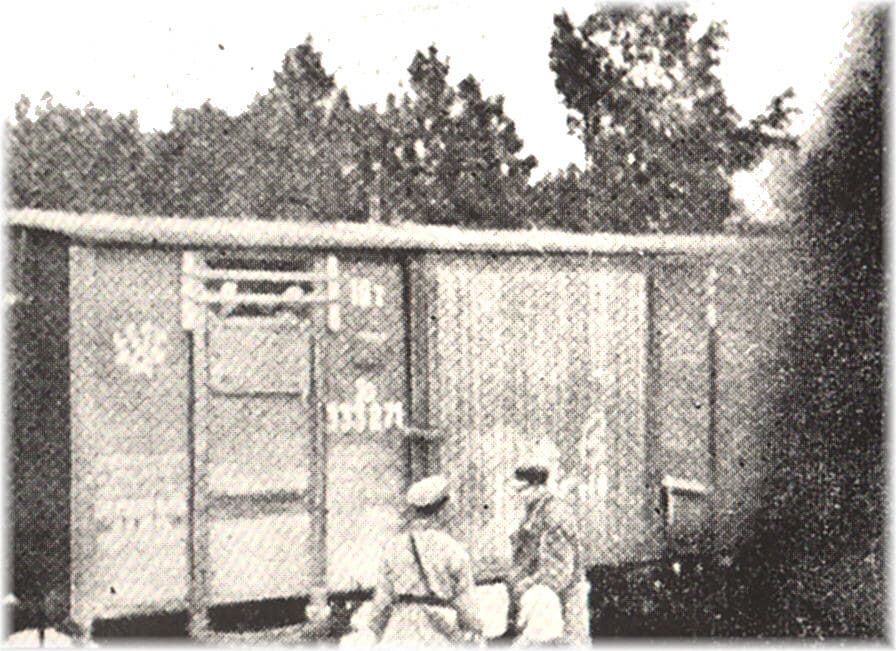
The next, third mass deportation took place at the turn of June and July 1940. It started in the early morning of June 29. Due to difficulties in detaining people designated for deportation and transport problems, the operation extended to almost a week. It covered (in accordance with previous arrangements) primarily refugees from central Poland rejected by the German resettlement commission.
In this case, most of the deportees were of Jewish, Belarusian and Ukrainian nationality. According to NKVD sources, Jews constituted over 80% of the total deported contingent. According to NKVD data for the second quarter of 1941, among the 76,113 exiles there were 84.56% Jews, 10.95% Poles, 2.26% Ukrainians, 0.24% Belarusians and 0.16% Germans. The final number of exiles, who in Soviet documents are referred to as spiecpieriesielency-bieżency, and who are also referred to as “the contingent of people who were to go to Germany but were not accepted by the German authorities”, amounted to 80,653 people. 22,879 were deported from “Western Belarus”, 57,774 from “Western Ukraine”. Data from the NKVD Convoy Troops indicate that 76,246 people were transported on 57 trains (52,617 from “Western Ukraine” and 23,629 from “Western Belarus”). The Soviet authorities did not manage to implement their plans until the end. Initially, it was intended to resettle as many as 102,683 people (83,207 family members and 19,476 single people) in “Western Ukraine”, and at least 23,057 people in “Western Belarus”.
People
Ivan Serov
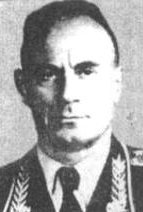
Ivan Serov
Ivan Serov was born on September 16, 1905 in the village of Afimskaya near Vologda (some sources give Vologda itself as his birthplace). In 1925 he joined the Red Army. Serov’s military career led him quite quickly to the position of an artillery officer, and subsequent promotions strengthened his position in the structures of the security services of the Soviet Union. Soon, Serov began his activity in the military intelligence of Razvedupru – the 4th Directorate of the General Staff (later GRU), i.e. a body subordinated to the leadership of the Red Army, responsible for coordinating intelligence services at a lower military level, collecting information resulting from, among others, from tactical and economic reconnaissance (in relation to military matters) of the enemy. At that time, he actively joined the criminal activities during the Stalinist Great Purge in the Red Army (affecting high-ranking officers in its ranks), avoiding repression himself. He also effectively managed the preceding actions against the population of Soviet Ukraine during the famine that was artificially induced there.
In 1939, Serov found himself in the NKVD of the USSR (People’s Commissariat for Internal Affairs of the USSR), and his position there was soon strengthened as a result of the personal protection of Lavrentiy Beria – then the head of the NKVD. As a result of such high support, Serov quickly found himself at the top of the authorities and was appointed head of the Secret Political Department of the Main Directorate of State Security (GUGB).
On September 2, 1939, Serov took the post of people’s commissar of internal affairs of the Ukrainian SRS. After the Soviet attack on Poland, which began on September 17, 1939, and after the Soviets annexed other European lands (in accordance with the Molotov-Ribbentrop Pact) – appointed by Beria – he became personally responsible for supervising part of the resettlement of people from areas occupied by the Red Army, including from the Eastern Borderlands of the Second Polish Republic. He coordinated activities related to deportations, signed reports sent to Moscow regarding deportations and managed subsequent activities related to deportations from the areas under his control. The experience gained at that time was used by Serov to supervise subsequent resettlement actions carried out by the Soviet Union, and later, e.g. resettlement of Lithuanians,
Until then, Ivan Serov (in the years 1941-1943) held the position of deputy head of counterintelligence SMERSH (Special Methods of Detection of Spies) and head of the NKGB of the USSR (People’s Commissariat for State Security of the USSR), and in 1943 he became Lavrentiy Beria’s deputy in the NKVD.
After the Soviet invasion of Poland in 1944, Serow coordinated activities aimed at breaking up the Polish independence underground. When in mid-February 1945 the Soviet political police launched a major provocation aimed at arresting members of the Council of National Unity, the National Council of Ministers and the Home Army command, Ivan Serov was in charge of the operation. At that time, he acted as Colonel-General Iwanow, who in fact did not exist. It was the pseudonym under which Serov, who was in charge of the operation against the leaders of the Polish underground, was hiding. On January 11, 1945, he was appointed plenipotentiary of the NKVD of the USSR at the 1st Belorussian Front, and on March 6, adviser to the NKVD at the Ministry of Public Security of the USSR. After the arrest (basically kidnapping) by the Soviets in March 1945 of the command of the Home Army, during the so-called Moscow During the trial of the sixteen, Serow personally interrogated and tortured Leopold Okulicki, later the Commander-in-Chief of the Home Army, who was then imprisoned in the Lubyanka prison in Moscow. For kidnapping Polish leaders, Stalin awarded him the title of Hero of the Soviet Union and promoted him to the rank of colonel-general. (Bolesław Bierut awarded him the Cross of the Order of Virtuti Militari IV class in April 1946; the order was taken away from Sierow only in 1995 by the President of the Republic of Poland, Lech Wałęsa.) The successes meant that Sierow continued to actively direct the activities of the NKVD in Poland and supervised mass arrests of former Home Army soldiers contributing to the final destruction of the structures of the Polish Underground State. later the Commander-in-Chief of the Home Army, who was then imprisoned in Moscow’s Lubyanka prison. For kidnapping Polish leaders, Stalin awarded him the title of Hero of the Soviet Union and promoted him to the rank of colonel-general. (Bolesław Bierut awarded him the Cross of the Order of Virtuti Militari IV class in April 1946; the order was taken away from Sierow only in 1995 by the President of the Republic of Poland, Lech Wałęsa.) The successes meant that Sierow continued to actively direct the activities of the NKVD in Poland and supervised mass arrests of former Home Army soldiers contributing to the final destruction of the structures of the Polish Underground State. later the Commander-in-Chief of the Home Army, who was then imprisoned in Moscow’s Lubyanka prison. For kidnapping Polish leaders, Stalin awarded him the title of Hero of the Soviet Union and promoted him to the rank of colonel-general. (Bolesław Bierut awarded him the Cross of the Order of Virtuti Militari IV class in April 1946; the order was taken away from Sierow only in 1995 by the President of the Republic of Poland, Lech Wałęsa.) The successes meant that Sierow continued to actively direct the activities of the NKVD in Poland and supervised mass arrests of former Home Army soldiers contributing to the final destruction of the structures of the Polish Underground State. For kidnapping Polish leaders, Stalin awarded him the title of Hero of the Soviet Union and promoted him to the rank of colonel-general. (Bolesław Bierut awarded him the Cross of the Order of Virtuti Militari IV class in April 1946; the order was taken away from Sierow only in 1995 by the President of the Republic of Poland, Lech Wałęsa.) The successes meant that Sierow continued to actively direct the activities of the NKVD in Poland and supervised mass arrests of former Home Army soldiers contributing to the final destruction of the structures of the Polish Underground State. For kidnapping Polish leaders, Stalin awarded him the title of Hero of the Soviet Union and promoted him to the rank of colonel-general. (Bolesław Bierut awarded him the Cross of the Order of Virtuti Militari IV class in April 1946; the order was taken away from Sierow only in 1995 by the President of the Republic of Poland, Lech Wałęsa.) The successes meant that Sierow continued to actively direct the activities of the NKVD in Poland and supervised mass arrests of former Home Army soldiers contributing to the final destruction of the structures of the Polish Underground State.
After the war, Ivan Serov still had a strong position in the Soviet power apparatus. After Stalin’s death in 1953, during the succession struggle, he opted for Khrushchev (then rivaling Lavrentiy Beria), for which he received the post of First Deputy Minister in the USSR Ministry of Internal Affairs. Later – already as the head of the KGB, which he managed in the years 1954-1956 – i.a. participated in the suppression of the Hungarian uprising of 1956, where he went personally to command the operations of the Soviet troops. In 1958, Serov took over the post of head of the GRU military intelligence, heading it until 1963. He retired in 1965 and died probably on July 1, 1990.
Ivan Serov
Born in Georgia. In the security organs, successively – CheKa/GPU/OGPU/NKVD since the early 1920s, e.g. as head of various departments of these authorities. From 1938 to 1941 – People’s Commissar of Internal Affairs of the Belarusian Soviet Socialist Republic, i.e. the head of the NKVD on the so-called Western Belarus. During this period, he was directly responsible for coordinating activities related to the resettlement of the Polish population from the Eastern Borderlands occupied by the Red Army after September 17, 1939. Later, deputy head of the Board of Special Departments of the People’s Commissariat of Internal Affairs – NKVD of the USSR. After the separation of the Main Directorate of State Security from the NKVD and the creation of a separate People’s Commissariat for State Security of the NKGB, which took place in 1941 (and for the second time in 1943), in 1944, he became the people’s commissar of state security (since 1946, the Ministry of Public Security of the MGB) of the Belarusian SRS, i.e. the head of the NKGB/MGB in Belarus. In this position, he oversaw the murder of Salomon Michoels, which was carried out at his dacha on the outskirts of Minsk. He held the position of Minister of Public Security of the Belarusian SSR until 1951. In the meantime, from January to April 1945, he also served as a representative of the NKVD / NKGB at the 2nd Belorussian Front. From October 29, 1951 to February 14, 1952, he was the deputy minister of the then bishop of the USSR, Sergei Ogoltsov, and his successor Semyon Ignatiev, acting as deputy minister of public security, he also held the position of head of the Second Main Directorate of the Ministry of State Security of the USSR, dealing with counterintelligence and internal security of the country. Arrested in connection with the case of Lavrentiy Beria in April 1953, he died there on October 12, 1955 while in prison.
Written Accounts
Helena Kliś-Niemira, deported from Rusnów in the province Volhynian:
Our journey was much better than those who were deported in February, because it was warm and we did not freeze on the way. None of the elders were allowed to look out the window of the freight wagon, only we, the children, sat in the windows without glass, there were two of them, closed with a wooden flap. We looked through these windows and told the adults what we saw. I remember driving through long tunnels in the Urals. The smoke from the locomotive was eating our eyes, there were probably four of them. They opened the wagons only far beyond Moscow. I also remember how at some small station, children and elderly people, emaciated, ragged, with bast-covered hands, approached the wagons asking for a piece of bread, and the guards drove them away, shouting: “You can’t run away!” Our skin crawled at the sight of these people.
We were driving through the fields once. A shepherd was grazing a herd of cows, we had some bread, we saw him standing barefoot and ragged looking at us, we threw him a piece of bread, he jumped at it as if he hadn’t seen it for a few months and immediately took it to his mouth and started eating it very much. greedily. This image has always stood before my eyes. A cold chill ran through us because we knew this would happen to us too.
They took us to Novosibirsk, where they took us to the baths. They ordered us to take a bath, took our clothes to steam them, and then drove everyone back to the wagons. They took us to Assina [near Tomsk], where they landed us on the bank of some large river [Czuly]. They gave us neither food nor drink and told us that there were fish in the river and plenty of water. […] After a few days, a ship arrived.
Russian FSRS, July 1940
Source: Memories of Siberians vol. 2, Warsaw 1990
Barbara Hebrowska, deported from Lviv:
On June 28, 1940, in the morning I gave the children breakfast as usual and went to church. I didn’t notice anything special. However, when I reached the halfway point of Krasińskiego Street, I suddenly saw a peasant cart loaded with suitcases, women with children and a few men on it, all crying, and NKVD guards next to them. It was as if lightning had struck me. I heard about Poles being deported deep into the USSR. Since the first deportations, I had things packed, clothes ready next to the children’s beds, food for a few days, and some money. I understood that Krasińskiego Street was half cleared of “bieżeniec” [refugees from the German occupation zone], i.e. Poles who did not have permanent residence. The deportations took place at night, so she still had some time. I ran to the church of St. Nicholas almost semi-conscious. I fell in when the priest was giving Holy Communion. I went to the railings, it seemed to me that I was taking viaticum – I started crying terribly and felt weak. I went to the sacristy and asked for water. An old man-priest approached me and asked what happened. I told him, he blessed me and calmed me down. Resigned but calm, I returned home, entrusting my children and myself to God’s care. […]
I waited, thinking and praying. Finally, after midnight, a truck with a few soldiers stopped in front of our villa. A sharp bell rings for the janitor, and he’ll call us in a moment. I opened it – a soldier came in, demanded papers, checked his notes. When he entered the room and found the children sleeping, he said to me: “Let them sleep, I will go upstairs first.” He was always quite kind towards us. However, I woke them up immediately because my sister-in-law was warming up the coffee. We had a warm drink and ate something. The soldier helped me carry out my things. When I was sitting on the truck bed, my sister-in-law Jadzia brought out two mattresses, and when I was wondering whether to take them, the soldier said: “Take it, everything will be useful there.”
Lviv, June 28-29, 1940
Source: Memories of Siberians vol. 8, Warsaw 1994
Piotr Michalewicz, deported from Włodzimierz Wołyński:
What shall we do? Should I sit here and wait for who knows what, or wander to the Bug River? You can’t stay here because there’s nothing to eat, and suddenly there’s a new rumor that, yes, repatriation will continue, but through a repatriation camp that is being built for refugees just beyond the former border with the USSR. We hear that the authorities decided this in order to organize the procedure, taking into account the difficult situation of refugees and the permanent population of the town. In the camp, refugees will receive food and will be systematically sent back home – across the Bug River.
The above information was neither provided by an official nor formally announced. It just spread among people. People tired of the constant ambiguity of the situation, uncertainty, hunger and, finally, concerned about the liquidation of the commission, were relieved to hear about the repatriation camp.
Before we recovered from our stupor, having learned that all roads, exits and exits from Vladimir had been closed by the army and militia, someone had already distributed the news that there was nothing to worry about, because the authorities only wanted to stop the further influx of refugees [from German occupation zone] to the town. We had no choice but to believe every rumor that reassured us.
It must be said that the process of psychological incapacitation using false-bad or false-good information, rumors, etc. – including filling out personal questionnaires for the NKVD by ourselves (also at the instigation of gossip and on forms distributed by the NKVD) – was carried out masterfully. We were so absorbed in the disinformation fed to us that no one noticed that, during the commission’s actions, the spare tracks at the station gradually began to fill with a large number of empty sets of freight trains, and the empty military barracks with NKVD and militia units. Meanwhile, young and single men were still arrested in night roundups, carried out as secretly and quietly as possible. It was a well-thought-out precaution – removing people who were active, unrestrained by anything, more prone to escape or resistance.
The invasion of the town by NKVD and militia units took place around two o’clock at night – on one of the last days of June 1940. Refugees not only camping outdoors but also from private apartments were taken away. People were driven out into the streets, in groups of a dozen or so, under a convoy of two soldiers for each group, and rushed to the reserve tracks; there they were loaded into wagons and, after filling, the wagon doors were closed from the outside. The operation lasted until approximately 7 a.m. When it was already light, the boys, sitting up to the barred windows of the carriage, informed that on all sides of the town, along the streets, paths, and across the gardens, there were militiamen and soldiers armed with rifles and plainclothes types (auxiliary militia recruited from among the local Ruthenian [Ukrainian] youth). , Jewish and Polish) – armed with guns – drove men, women, children and the elderly. Some people walked empty-handed, others carried their luggage with difficulty. Everything happened calmly, without any disturbances. Nobody rushed anyone. People walked alone.
Once started, the machine works blindly and mercilessly: random passers-by, local residents who had nothing to do with the commission, were also rounded up from the streets. A man with the appearance of a worker struggles and shouts: “Let me go, I’m here! My wife and children!” Niczewo – the machine replies – you’ll tell me on the spot that it’s local – and they drag him to the wagon. The poor people did not yet know the Russian mentality – the stupid Asian cruelty.
Włodzimierz Wołyński, June 1940
Source: Memories of Siberians vol. 5, Warsaw 1991
Piotr Michalewicz, deported from Włodzimierz Wołyński:
There was silence in the carriage. We reflected on the ordeal of last night. None of the refugees put up any resistance. We walked humbly under bayonets to the train that would take us to the “repatriation camp just across the border.” We were surprised that it was at night and that there were so many militia and army people there. But we reassured ourselves – if they said they would take us to a repatriation camp, we had to believe them.
There were no more than 35 people in the carriage. We could sit on the floor. We were interested in a small rectangular hole cut in the middle of the floor. The children realized faster: “Mom, this is for peeing!” Our potty stayed in Warsaw. The conversations weren’t going well. What is there to talk about? We’re going! In a few or a dozen or so hours everything will become clear. But a doubt crept into the void of thought: the authorities said they would take him to a repatriation camp. But what power? Where and to whom did the authorities say this? Who do we know this from? Everyone said: after all, we filled out surveys. Yes, the poll held everyone together and meanwhile the military took positions. There was no written announcement, no information from any official person. So what? Hoax? Fraud? Can the authorities be accused of lying, perversity and deceit? The authorities guide us, that is, they take care of us. We were terribly tired.
Between Włodzimierz Wołyński and the Polish border station of Sarny [in the border district with the former Polish-Soviet border], the train had only a few short stops, during which the doors of the carriages were not opened. In Sarny, our train was moved to spare tracks and the wagons were opened. Right opposite ours was a long freight train on a widened track. Several Soviet railway workers announced along our train that we should quickly change to the carriages standing opposite. Neither the militia nor the NKVD were visible (it turned out that they were hidden in the convoy wagon). What to do? Let’s change trains if we have to.
People reluctantly, slowly, as if reluctantly, looking at each other, loaded onto the Russian train. I guess everything’s fine – everyone thought – the camp is supposed to be just across the border, and yet the railway tracks here are wide.
My wife and I looked inside the carriage – a hole cut in the floor, and bunks. Yes, there are bunks on both sides of the carriage. What for? Long journey or what? What to do? What does all this mean? We were about to follow the others into the wagon when a man’s terrifying scream was heard a few wagons away. Four NKVD members, including one an officer, knocked the struggling old man to the ground, then lifted him up and threw him into a Russian wagon. The man shouted with all his might: People, don’t get into these wagons! You won’t come back! I’ve been there before! I’ve been there before! Run!”
Włodzimierz Wołyński, Sarny; Ukrainian SRS, June-July 1940
Source: Memories of Siberians vol. 5, Warsaw 1991
Piotr Michalewicz, deported from Włodzimierz Wołyński:
We did not know yet that we were in the hands of the authorities who, thanks to an agreement with Hitler, treated us as the property of the Soviet Union. At some stops, wagons were opened to give bread and water and then closed again. Only deep in Russia did they stop locking the doors from the outside. For longer stops, the train was moved to tracks distant from the station buildings. There were no contacts with the local population. During almost three weeks of transport, not a single Russian approached the train, which surprised us greatly.
We were escorted by a platoon of NKVD soldiers. The escort wagon was located approximately in the middle of the set. As we moved deeper into Russia, bread was distributed less and less often. We didn’t feel too hungry – we lay motionless on the boards. It was worse with children. At one of the stops, mothers gathered next to the guards’ wagon and demanded bread for their children. The officer explained that it was not up to him and dispersed the women with his fists.
When a person is incapacitated and does not know what will happen to him next, his thinking function gradually begins to weaken. Someone in our wagon says to a crying woman: “They don’t give us bread because they are obviously having difficulties – the war is going on.” After a while, the same man jumps up from the bunk, shouting: “What am I talking about? There’s no war here – why aren’t they fed? “Hitler, you see, they are feeding him!” – says the woman consciously and continues to sob.
Ukrainian SRS, Russian FSRS, June-July 1940
Source: Memories of Siberians vol. 5, Warsaw 1991
Piotr Michalewicz, deported from Włodzimierz Wołyński:
Adults tried to use the hole in the floor of the carriage at night, if possible. Those who had to use it during the day under the cover of a blanket or a rag held by another person. Some suffered from some kind of nervous inhibition – they could not use the hole in the presence of others. Hunger obstruction oppressed people. A few people developed intestinal disease. They screamed so long and so terribly that the others couldn’t stand it and started screaming too. They were finally taken away.
[…] In almost three weeks, no one from the Soviet service or Polish doctors-prisoners appeared in front of our wagon to ask if there were any sick people. And many children were dragged on the train, there were also pregnant women, and there were sick people. We reported seriously ill patients to the convoy commander – they were taken away, but their families were not allowed to accompany them. Then people stopped reporting seriously ill people.
Ukrainian SRS, Russian FSRS, June-July 1940
Source: Memories of Siberians vol. 5, Warsaw 1991
Piotr Michalewicz, deported from Włodzimierz Wołyński:
Initially, there were 30 people in our wagon. Railway workers from Poznań with their families, miners and officials from Silesia – with their families, people from Krakow and Warsaw – officials, workers, soldiers, and two Jewish families. Silesians, Poznań residents and Jews consciously left their homes for fear of persecution or revenge from the Nazis. The rest were people evacuated from the capital or otherwise pushed to the south-east of the country by war.
Ukrainian SRS, Russian FSRS, June-July 1940
Source: Memories of Siberians vol. 5, Warsaw 1991
Piotr Michalewicz, deported from Włodzimierz Wołyński:
The further we went into Russia, the less bread we were given. It seemed that the organization was limping. Perhaps she was limping – too many human trains were rushing in the same direction. When, after leaving the camp and gradually regaining my memory, I began to think about these matters, I became convinced that few things happened due to chance or organizational deficiencies. Most of the situations and moves we witnessed looked well-thought-out and deliberate. You cannot effectively manipulate individuals or masses if you do not use well-thought-out and proven methods of conduct. The Soviet government and its agencies for moving human cargo have proven methods of mentally and physically incapacitating people at the time and to the extent necessary for the success of the intended operation.
After crossing the Urals, we received a small cube of bread once every two days. This was supposed to stimulate our desire to finally reach our destination, no matter where, it would be better and more normal there. In this way, we were prepared to accept with abandon what we would find at our destination.
This is how a dozen or so freight trains loaded with starving people headed east from Vladimir alone. The Urals are behind us. The guards opened the locks of the wagons. There are no illusions anymore – we are in Siberia. We read the names of larger stations: Chelyabinsk, Kurgan, Petropavlovsk, Omsk, Novosibirsk. Train stops are longer at some stations. Traffic has probably thickened on the Siberian main road. Trains with people kidnapped from Poland converge here with other trains carrying “goods” from various corners of the Soviet empire.
Russian FSRS, Kazakh SRS, July 1940
Source: Memories of Siberians vol. 5, Warsaw 1991
Piotr Michalewicz, deported from Włodzimierz Wołyński:
The conversations in our carriage had long since died down; now they have stopped completely. What were we thinking? About nothing. My thinking was frozen with anticipation of what would happen next. With difficulty and reluctance, fragments of self-regrets slipped through our minds: Why didn’t we resist in Sarny? Why, when we were already deep in Russia, didn’t we all get off the train in some place and demand to be taken back? They wouldn’t shoot at us, they would just use some trick.
The third week of riding begins. We passed Novosibirsk without stopping. Tomsk – stopover. It’s morning. After an hour, the carriage doors were locked from the outside again. The train is moving. It passes the station tracks, but it does not pick up speed, it moves slowly. We lie on the bunks. Depression creeps across the bearded faces of men and the sunken cheeks of women and children. On the opposite side of the bunk, a girl pressed her face against the window grate. Mom! What’s that? What’s that? The mother reluctantly pulls herself up to the window: God! What is this? Everyone is pushing towards the window cracks. I crawled to the other side of the bunk. I look. After a while, I realize that our train has left the higher-lying Tomsk behind and is slowly rolling from the highlands onto a lonely railway branch with a steep slope. All around, the entire area was covered with a motionless, gloomy shroud of dense dark green mass, blackening more and more towards the distant horizon. Here and there this mass rose with small bulges, and here and there it sank. Other than that, nothing. Only this dark green mass fascinates with its terrifying enormity. There was a sob somewhere in the corner, not a single word was spoken. People silently moved one another away from the window slit and looked.
Tomsk Oblast, Russian FSRS, July 1940
Source: Memories of Siberians vol. 5, Warsaw 1991
Irena Szablińska-Żurawska, deported from Włodzimierz Wołyński:
One day there was a riot in the wagon. Our starosta rebelled, declaring that he was resigning because he was unable to cope with all the duties that we had kindly entrusted him with. And it must be admitted that our “commander” had to show considerable heroism to control every situation. First, he had to be a good organizer. Someone will think – what kind of organization, what? And yet he had to establish the duties of the so-called meal carriers (there were many volunteers) and the cleaners of our unfortunate toilet (there were fewer people willing to do so). And that was quite a problem. In addition, he had to be patient, understanding and physically strong. Unfortunately, he lacked this last advantage. So he stayed, but got a midfielder with a fairly good athletic build. This midfielder had to tactfully and properly use the advantages of his body. So he carried the sick, children and even the dead (there were two such cases here), and he also had to separate those in conflict. He performed his duties well.
Russian FSRS, July 1940
Source: Memories of Siberians vol. 6, Warsaw 1992
Irena Szablińska-Żurawska, deported from Włodzimierz Wołyński:
The Ural Mountains were getting closer – the mysterious, dangerous humps of the mountains, shimmering with pink and purple, were frightening. Anyone who could, rushed to the window and to the gaps between the boards of the carriage. Everyone was curious about this different world. We finally made it through these mountains. I had the impression that we had passed through a prison gate. I looked at the receding mountains – both terrible and beautiful – and thought: “God! Will we be judged to return through this hellish Ural gate?”
Russian FSRS, July 1940
Source: Memories of Siberians vol. 6, Warsaw 1992
Irena Szablińska-Żurawska, deported from Włodzimierz Wołyński:
Finally we stop at a siding at a station [Asino]. They said there were no tracks any further. Screams: “Get off with your luggage!” We climb out of the wagons with our belongings. We stand unsteadily on our feet. We inhale the fresh air with pleasure. We look around and see the dark water of the [Czuły] river in front of us.
After checking some census records, they let us set up camp. We light fires along the river bank, boil water, pour biscuits and eat them. We scrub our dishes with sand for a long time, which are terribly dirty due to this journey. We wash, but only at the shore – the water is wonderful, refreshing, what a relief. We would love to dive in, but somehow we are afraid of this strange river. We lie down on our beds, but we cannot sleep. Soldiers are circulating around. Apparently it’s already night. We’re surprised, it wasn’t dark after all. Someone says that Siberian nights are white.
The sun is rising. Steamboats and barges pulled by cutters approach. They’re loading us. My father and I were put on a steamship into the hold. We are packed like herrings in a barrel. We’re sailing away. We children sneak out onto the deck. We watch the river. It is wide, even very wide in places, somewhat dark and alien, with amazing cliffs at the edges. We preferred not to look at her. She terrified us. We were more interested in life on the ship. There were passenger cabins. Russians ate dishes that we had not seen for a long time. We looked at them hungrily. They looked at us like we were some overseas creatures. They asked where we came from? Why are we dirty? Usually, we didn’t have time to answer because the guards chased us away, telling us that we were “children of mean bourgeoisie” and that they should not associate with us.
Tomsk Oblast, Russian FSRS, July 1940
Source: Memories of Siberians vol. 6, Warsaw 1992
Irena Szymkowiak, deported from Schodnica in the province. Lviv:
We have been deceived in a perfidious way. It was announced that anyone who wants to go west to Poland [to the German occupation zone] must report to the municipal office and register there, because the border to the west will be opened three times and those willing will go there. We waited a long time and wondered whether to register or not. We decided to go to Żydowo. It didn’t take long after registration, maybe four days. At that time, we lived in a palace belonging to the Polish director who worked in an oil mine. The door opened and an NKVD entered the apartment with a Pole who was still temporarily working at the commune office. We heard the following sentence from the mouth of an NKVD: “Ms. Szymkowiak, we came to your place to look for weapons.” And our mother replied, “I, a woman with children so young, am I supposed to own a gun?” He laughed and said: “Pack your bags and go to your husband.” And outside the window you could already hear the snorting of horses and the clatter of carts. We were given little time, about 30 minutes.
We were loaded into carts and drove to an unknown direction. After a few hours of driving, we arrived at the station. There we met all the Poles who had registered with us for the trip to Poland and those who had been caught in street roundups. Such roundups were organized day and night. The train headed east. Everyone now understood what they had registered us for. But it was too late. The train ran all day and night. People in the wagons went crazy with despair, they realized how perfidious they had been deceived.
Skhidnytsia, June 29, 1940
Source: Memories of Siberians vol. 6, Warsaw 1992
Kazimierz Kaniewski, deported from Schodnica in the province. Lviv:
At night, my mother, sister and me were woken up by a loud knock on the door. When I asked who was there, the owner of the house spoke up and opened the door for him. When my mother opened the door, the owner and two soldiers with rifles and so-called caps on their heads came in. budionówka. They searched for weapons and found nothing but their father’s razor. They told us to get dressed and go with them, and when our mother asked where we were going, they told us that we were going to “Germany”, i.e. to Germany. My mother wanted to pack something, but they wouldn’t let me. Under the convoy of these soldiers, we were taken to some cargo transport. All the wagons were filled with Poles, mainly Jews. The wagons were designed to transport people, they were double-decker to accommodate as many people as possible, so we had to lie down and, to stretch our bones, we went to the middle of the wagon, i.e. to the aisle, where the doors opened. These doors were locked from the outside during the journey and were opened by guards only at stations during longer stops, when we were sometimes given some soup or dry food, i.e. some groats or stale flour. During longer stops, we cooked in pots placed on bricks, stones, wherever we could. We often cooked the same food at two or three stations because it was undercooked, which is why we suffered from stomach pain and more.
Skhidnitsa, Ukrainian SRS, June-July 1940
Source: Memories of Siberians vol. 6, Warsaw 1992
Irena Gołębiowska-Jabłońska, deported from Podbuże in the province. Lviv:
In May, the passporting of all Russians under the rule was announced, except for those who were on the list of people willing to return to their homes west of the San. These people were called “biebiecki” – fugitives. We signed up for this list, believing that we would meet our father sooner. It happened differently.
On the night of June 28-29, 1940, one policeman, one NKVD officer and one Ukrainian broke into our house. All with weapons in their hands. They conducted a thorough search, told me and my brother to wake up, and then told us to pack. As requested, we are going home – to Sanok. The entire “delegation” was quite polite and even suggested what else we should take with us.
There were two carts parked in front of the house. We sensed that something bad was happening. At 4.30, me, my mother and my brother, biding farewell to the family’s tears, accompanied by a policeman, left towards Drohobycz. We learned that we had a long journey ahead of us, but not to the west, but to the east. In Drohobycz, we were thrown into a cattle wagon with our luggage and the doors were closed. Darkness enveloped us, even though it was a beautiful, hot day. We were alone. But after a while, the carriage was filled with “lucky” people like us.
Podbuże, June 29, 1940
Source: Memories of Siberians vol. 6, Warsaw 1992
Irena Gołębiowska-Jabłońska, deported from Podbuże in the province. Lviv:
Hot nights and hot days. We ate what everyone had. Soon, regardless of differences in age or views, we became one poor family. I was no longer even surprised by the loud, groaning prayers of the Jews.
In Lviv, two people were let out at the station and after a while they brought a bucket of hot water and a bag of fresh bread. Regardless of the late hour, everyone started eating. A few more wagons filled with “poor people” were attached.
Next stop in Tarnopol. The weather was beautiful, cloudless. And again, as before, two people from each wagon went out to get cold water from the railway pump and boiled water from the locomotive. I was among these people. While I was filling the bucket and jug with water, a young man who was working on unloading the wagons approached me and said, “Ma’am, please stay here. I’ll take care of you. “This transport is going to Siberia, and you are so young.” Unfortunately, I couldn’t agree, I had to be with my mother and brother. The young man helped me carry water to the carriage and left with the words: “Please think about it, there are still a few minutes before the train leaves.”
In Kiev, the guards brought pearl barley with olive oil, bread and boiled water to the wagon. The same at the Kharkov, Voronezh, Tambov stations. One day similar to another. In the morning, relieving yourself in front of everyone, then washing yourself if there was water in the wagon, and having a modest breakfast. And then remembering home and loved ones and humming Polish songs. It was necessary to shorten this monotonous time somehow.
Ukrainian SRS, June 1940
Source: Memories of Siberians vol. 6, Warsaw 199
Irena Gołębiowska-Jabłońska, deported from Podbuże in the province. Lviv:
[City] Penza. Convoys of various nationalities – Ukrainians, Tatars, Buryats, Mongols – open the heavy door and shout “Faster, faster!” they drive everyone out of the wagons and take them to the baths. In the large hall, all women and children must undress and take their clothes to the delousing room. Clothes were hung on metal rings and handed over to the bathhouse staff through the window. The guards were sitting on the window and laughing at the naked people. There were young, old and very old women with sagging bodies. After bathing, the washed clothes were given away. And again, amidst the roars of the guards: “Come on, bystrej” – we returned to the wagons.
Mrs. Maria Ulewicz’s sister is feeling worse and worse. It’s hard for her to breathe and she’s sweating a lot. When we arrived in Kuibyshev [now Samara], all the wagon doors were opened, but the guards did not let us out of their sight. I sat down on the edge of the carriage and a Russian officer walked by. He became interested in the conditions in the wagon. I pointed to the sick woman. He called the guard and told him not to lock the wagon. He said to me: ” Dewochka , you will drive with the door open, but you respond with your head if someone runs away.” Everyone sighed and looked at me as a savior.
On July 14, 1940, we passed through the Urals. The train slowly climbs up and slowly rolls down. The mountains are bathed in beautiful shades of red at sunrise.
Ufa station. Cool, fresh air comes in through the open door. The train stopped in the open. We washed ourselves in icy water next to the wagons. After a while they roar again to get into the wagons, and whoever cannot jump in is thrown in like a dead thing.
We slowly drive through uninhabited areas. We stop at larger stations to get bread and water. We pass through Chelyabinsk, Omsk, Novosibirsk. We stay longer in Krasnoyarsk. The guards herd everyone from the wagons to a large square in front of the bathhouse. Here’s an overview of the heads. When lice were noticed, the head was shaved bald. “Our” carriage was exceptionally clean and no insects were found on anyone. After the inspection, the bathhouse and again – as before – a “parade” of nudes in front of the laughing guards. For the journey we get bread, hot water, and pearl barley with olive oil. Ponderous wagons in the great heat move east – to Irkutsk. They’re unloading us here. You have to carry things on your back several hundred meters above the Angara to load onto the barges provided. We have a place below deck, squeezed one next to the other. There are three toilets on board for several hundred people. Drinking water is drawn from the river. People start getting bloody diarrhoea. There are no medications. Two Jews commit suicide by cutting their veins with a razor. They throw the bodies into the river. There is general dejection.
We sail along the Angara to Bratsk. Here we board the trucks that are taking us to Ust’-Kut, east of Bratsk nad Lena. We spend the night outdoors. In the morning they give us painful injections under the shoulder blade against typhoid fever. After a one-day stop, we get back on the barges and sail along the Lena to Zajarsk. I became seriously ill with diarrhoea. It was horrible, but after a few days I felt better. We reached the town of Bodajbo on the Witim River, the right tributary of the Lena. It was August 13, 1940
Russian FSRS, Irkutsk Oblast, July 1940
Source: Memories of Siberians vol. 6, Warsaw 1992
An anonymous man deported from Włodzimierz Wołyński:
To this day I don’t know how my father found out that we were on the deportation list in the next transport. He did not want to go to Russia and tried his best to avoid deportation. He learned that there was a mixed Soviet-German commission in Volodymyr-Volynsky and with its help he could get under German occupation as a refugee from central Poland. There was no time to think. We packed the most valuable and necessary things and, loaded with bundles, we set off as a family to Włodzimierz Wołyński. I didn’t expect then that a nomadic life like a gypsy’s would begin and that it would last for several years.
From the beginning of June, the commission did not accept anyone, and soon the fugitives were informed that the commission had ended its activities. Before the fugitives could decide what to do next and where to go, all residents of the city were announced to immediately report to the NKVD who the fugitives were from. At the same time, there was a threat that if someone did not register and they found runaways, they would be deported. In the face of such a strong argument, no one wanted to put themselves or their families at risk. The host with whom we lived told my father that he would not report us to the NKVD, but we had to leave his property immediately. There was no choice. We couldn’t endanger the owner and his family with our presence, and we had nowhere to go. The temporary hiding place was the bushes on the outskirts of the city, behind the square behind which stood the framework of a newly built villa. Few people visited this retreat, and the thick bushes provided a perfect hiding place. All four of them hid in them a dozen or so meters from their edge […]. During the day, my father carried out a reconnaissance and in the evening it was decided that the next morning we would go to the countryside, because it is dangerous to walk at night. That night was tragic for us. In the evening, the sky was covered with dark clouds and soon it started to rain. A strong storm with lightning and heavy rain lasted until midnight. We were all soaked, as well as the ground beneath us. It was already well after midnight when the father decided to go to the nearest farmer to bring a sheaf of dry straw for a bed. It was a dark night all around and after such a storm he didn’t expect to meet anyone at such a late hour. He calmly reached the framework of the villa under construction and when he passed it, he heard a loud “Stop! Hands up!”. Obediently, he raised his hands and looked back. Two NKVD men approached him from behind with reprimands in their hands. He immediately realized that he was caught and he couldn’t get away from them. He did not want to leave his wife and children, considering that they would not be able to cope with this difficult situation on their own, so he decided to reveal where the others were hiding. We were brought to a large red brick building and led into a spacious room with several people already inside. There was nothing to lie on or sit on. The only thing that was in this room was a sewer hole in the corner. Fatigue and sleepiness were so noticeable that, despite the uncomfortable positions, everyone quickly fell asleep. A dozen or so tenants like us arrived every day. It became cramped and stuffy. After a few days, the guard told me to gather all my things and go out to the courtyard. Here a column of four was formed and, under the escort of guards, we were taken to a railway siding where there were covered freight wagons with windows barred with barbed wire. There was no doubt that this transport was prepared for deportation to Siberia and we would go just like our predecessors from four months ago. Stuffing people in wagons like herrings in a barrel.
Włodzimierz Wołyński, June 1940
Source: Sybirak no. 13, Białystok 1995
